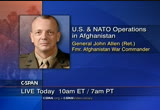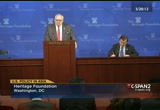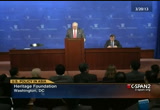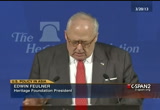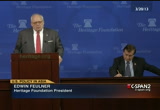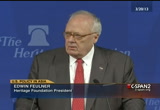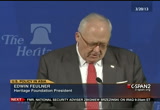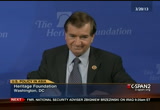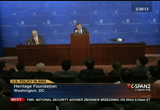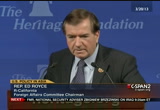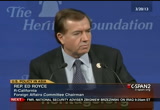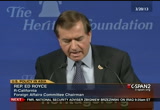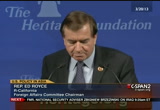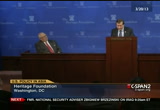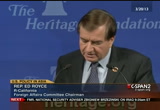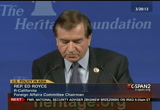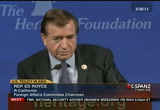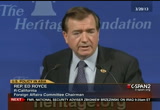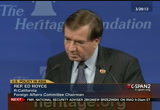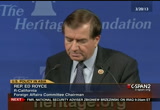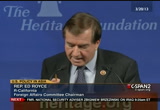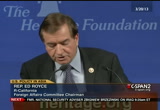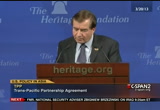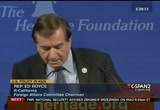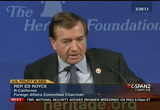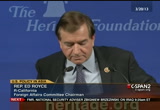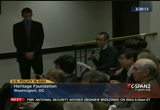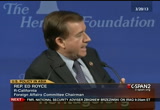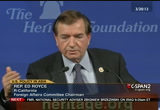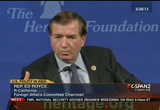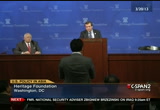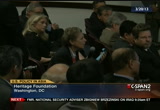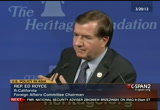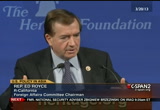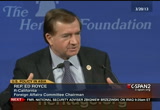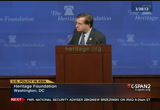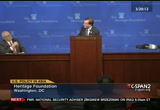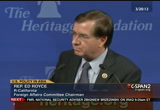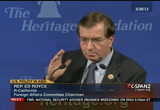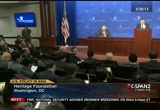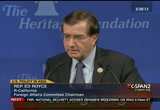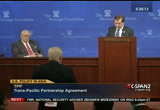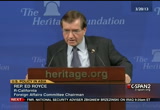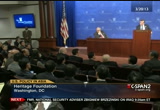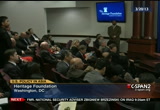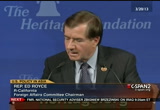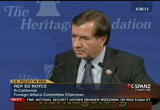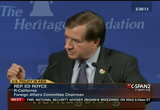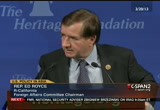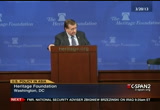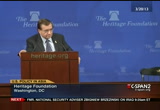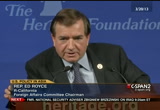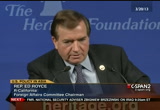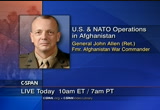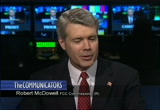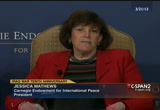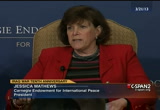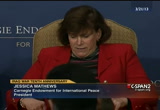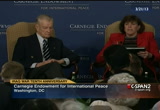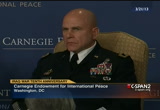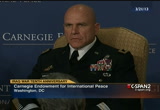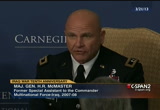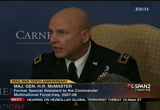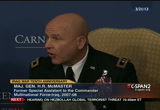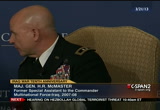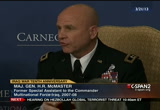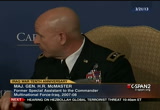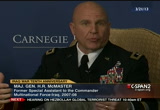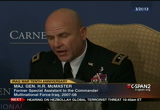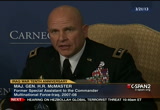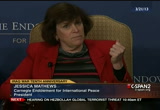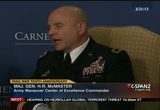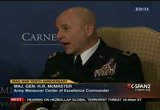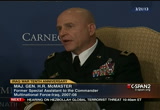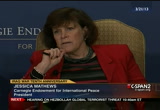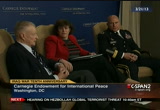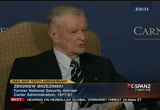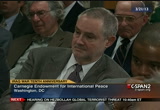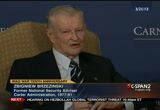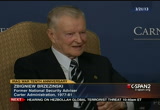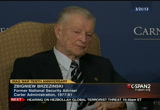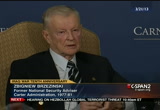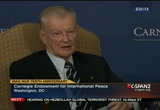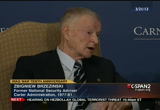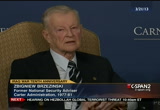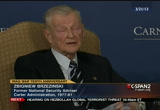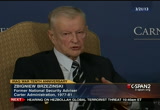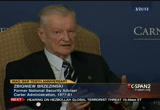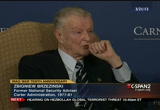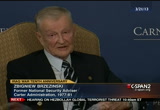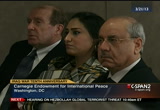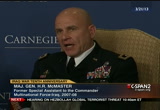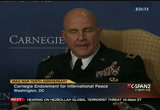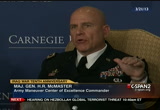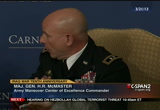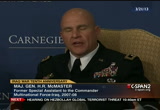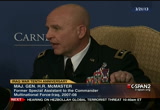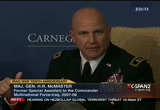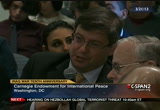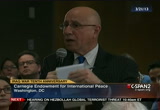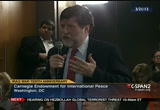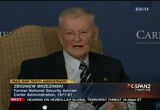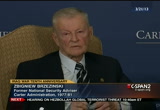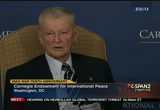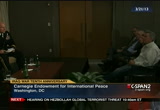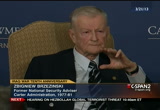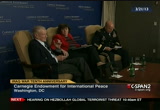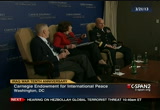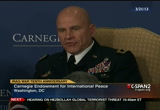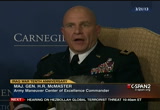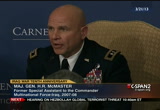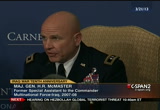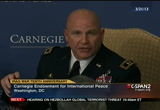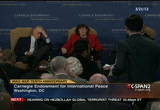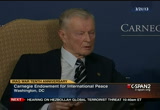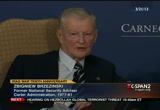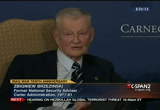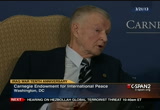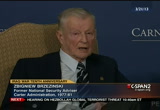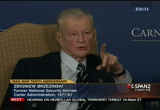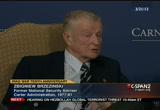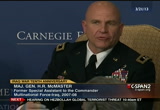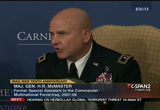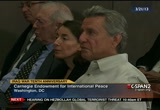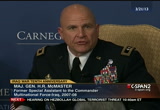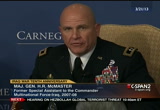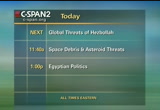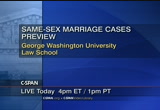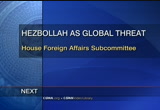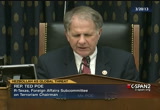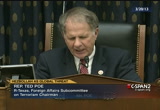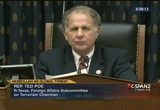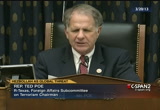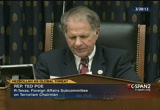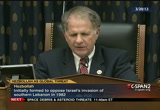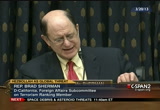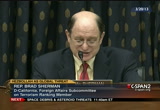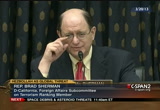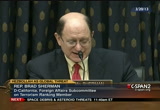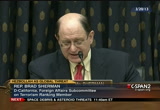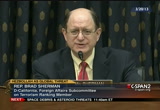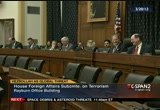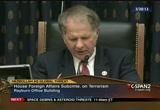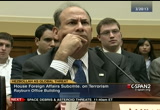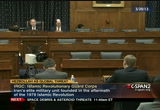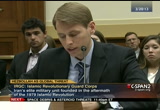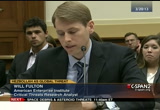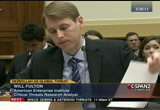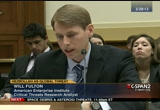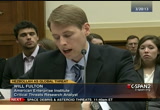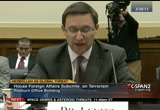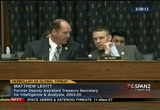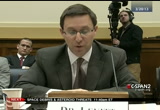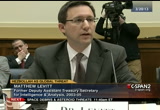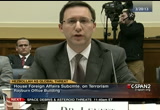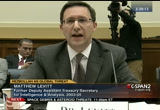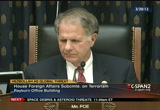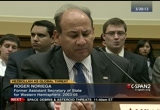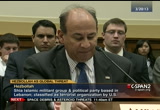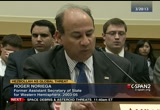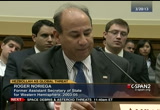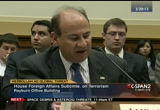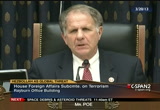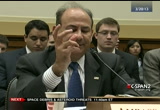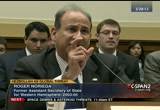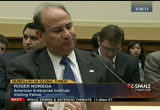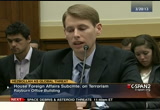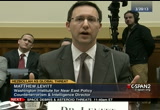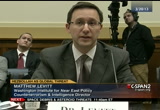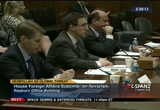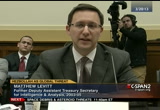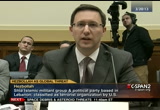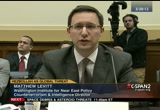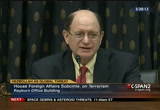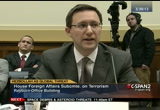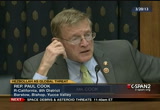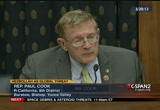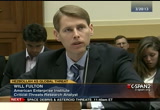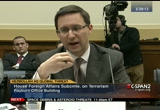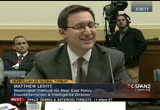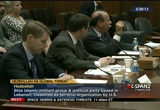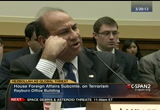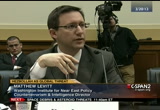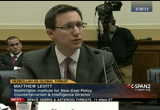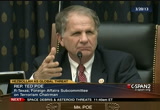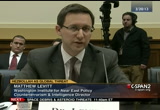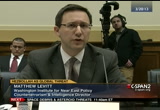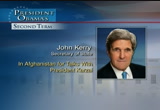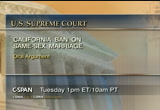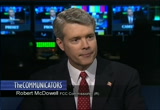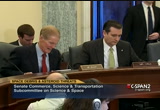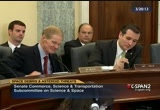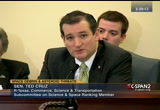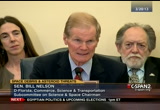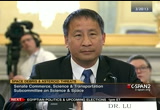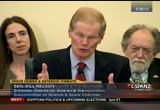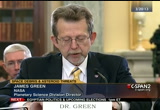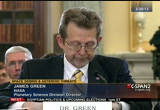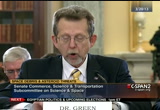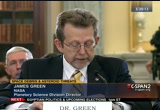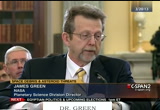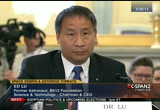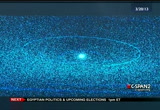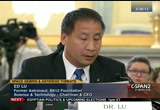tv U.S. Senate CSPAN March 25, 2013 8:30am-12:00pm EDT
8:30 am
to you as a public -- brought to you as a public service by your television provider. >> coming up next, house foreign affairs committee chairman ed royce talks about u.s. policy towards the asia-pacific region including u.s. relations with china and north korea's nuclear program. then former national security adviser brzezinski discusses the situation in iraq at a forum marking the tenth anniversary of the war. and later, former state and treasury department officials discuss the orange of the islamic militant -- origin of the islamic militant group hezbollah and its global terrorist threat. >> also today retired general john allen who commanded forces in afghanistan discusses the progress of the war during his command and the future mission of the u.s. and nato in the country. general allen led the forces in
8:31 am
afghanistan for 19 months from mid 2011 through february of this year. he'll be hosted by the brookings institution, and you can see his remarks live later in this morning at 10 a.m. eastern on c-span. >> tonight on "first ladies," called a bigamist and adulterer during her husband's 1828 presidential campaign, rachel jackson chis of an -- dies of an apparent heart attack. house hostess but is later dismissed as fallout from a scandal. and during the next administration, angelica van buren is the white house hostess for her father-in-law, president martin van buren, who is a widower. we'll include your questions and comments by phone, facebook and twitter live tonight at 9 ian on c-span and c-span3, also on c-span radio and c-span.org. >> now,ous foreign affairs -- house foreign affairs committee
8:32 am
chairman ed royce on u.s. policy towards the asia-pacific region. in remarks to the heritage foundation, he emphasizes the need to focus on economic prosperity in asia. he also discusses u.s./china relations, north korea's nuclear program and the trans-pacific partnership trade agreement. this is about 50 minutes. >> good morning, ladies and gentlemen. my name is edwin feulner, for the next 13 days i am the president of the heritage foundation. [laughter] i'm delighted to have with us in this morning my successor as the new president of the heritage foundation can, senator jim demint. we're very happy you're able to join us this morning for our 17th annual lecture. i welcome you all. it's good to see so many friends here, and it's particularly
8:33 am
happy occasion for us to be able to co--host the reception -- can co-host the reception afterwards with our good friend, the ambassador from the republic of korea. it's a very special time for korea. we celebrate the first anniversary of chorus, and we celebrate and commemorate the 60th anniversary of the end of the korean war. today we have a number of other significant guests who are here with us representing the samsung company from their new jersey headquarters, mr.m.j. han. mr. han, we're happy to welcome you here on behalf of the chairman of samsung, our good friend and longtime member of the heritage foundation. we're delighted to have so many members of the diplomatic corps here with us.
8:34 am
ambassador hang from cambodia is here this morning, ambassador quishea from the philippines is here, ambassador jalal from indonesia is here. we also have the dcms from a number of our asia-pacific partnerships including australia, japan, singapore, thailand and vietnam. we have hong kong's commissioner for economic and trade affairs, donald tong, with us today, and it's always good to see him. leo lee from tech row is here, and i thank all of you for making a special effort to be with us here today to welcome the chairman of the house committee on foreign affairsment again, this is a confluence of several anniversaries, the 16th time we've convened to celebrate the life of the late chairman
8:35 am
cho, the founder of the samsung group with a major address on asian policy. mr. chairman, today you are succeeding a long line of distinguished speakers over the years. our first b.c. lee lecturer was former secretary of state henry kissinger. subsequently, we have heard from chairman of the senate foreign relations committee, senator jesse helms, we've heard from your predecessors, ben gilman and henry hyde on the house foreign affairs committee and don rumsfeld, colin powell, condoleezza rice and others. our last b.c. lee lecturer was senator joe lieberman. so we have over the years, we think, made a significant and substantial contribution to american policymakers' understanding of the challenges we face in terms of our policies towards asia. this is, in fact, also the 30th
8:36 am
anniversary of the founding of the heritage foundation's asia studies center. when dick allen and i started the asian studies center back in 1983, it was our first dedicated foreign policy center at the heritage foundation. back then asian security was all about what's happening here in the cold war. from that perspective study of the soviet union might have made a lot more sense. dick and i as we talked it through talked about the potential that someday it might even be conceivable that u.s. trade with asia would actually even call our trade with -- equal our trade with what was going on across the atlantic. today, as you all know, of course, it's much greater, it's several times greater than our trade across the atlantic. we've been blessed by the insights of many dear friends in asia. we have over the years seen the remarkable economic growth and economic development in asia.
8:37 am
it's been our very great pleasure, in fact, to recognize that in terms of economic freedom as it has evolved throughout asia in specific countries and, indeed, throughout the region. we always knew that our good friends in japan and that the u.s./japan mutual relationship, both the mutual defense treaty and our bilateral general relationship would be central. but we also thought that asia deserved fully a broader treatment in its own right, so we really invested in the future. as we look ahead in terms of our asian studies center, we look also to other achievements in both the range of foreign and strategic issues as well as economic policy issues. in fact, today they are also
8:38 am
interlinked that it is hard to distinguish one from the other. but today as we look ahead there is no one i can think of whom i would rather hear from and help us both to celebrate these anniversaries and to look ahead in terms of developments in the asia-pacific region. the chairman of the house foreign affairs committee, ed royce, is an old friend of the heritage foundation. he is also a real leader on foreign affairs. he has been actively involved in a very principled and substantial way with u.s. policy toward asia since he first came to congress 11 terms ago. representing california's 39th district, we are, indeed, very honored both to have the chairman here and also to have his wife with us. marie, thank you for being with us today. it's, as we look ahead and, mr. chairman, we look forward very much to your insight as to what we might expect. we all understand that today the
8:39 am
world is a very dangerous place. i understand you've just come from chairing hearings on the current situation if -- in syria which is certainly a flashpoint in the world today. but as we look back and we stay focused here in this confines today anyway, it's our great pleasure to ask you if you would to come up and share your insights with us on the united states, asia and the future. thank you and welcome back. [applause] >> thank you, ed. thank you very much. [applause] well, good morning, ambassador choi, marie, distinguished guests, ladies and gentlemen. i must tell you i am delighted to be here. they tell me that the b.c. lee lecture has a long and distinguished history. well, so has ed feulner, you know in and i just wanted to take a minute and thank him for
8:40 am
the leadership that he has given this institution for is -- for so long. also i should say a word about walter loman and nick accident, director of the round table, because without him we wouldn't have the asia-pacific press here today and wouldn't have the round table that he does in outreachment well, i think i should begin by telling you that board choi and i were -- ambassador choi and i were recently in california, and we were there with veterans of the korean war. and there is, indeed, a unique bond that exists between veterans and those that they fought so bravely to product. and we saw -- to protect. and we saw that bond there that day, and it is a reminder of the special relationship that exists between our countries that goes back some 60 years.
8:41 am
but it is also a reminder that as that relationship has matured, so has south korea evolved. if we remember the situation after the deaf station of -- devastation of the war, everything was in ashes. you see those photographs brought become by -- brought back by those g.i.s that shows the absolutely destruction on that peninsula. and today as owe -- as you go back to seoul and you behold what has come to pass, it is phenomenal that at this 60th anniversary and at this one-year anniversary, frankly, of our chorus legislation, legislation which i co-authored, we are, we are looking at a korea that i think would have been unimaginable to that generation, to those men who accepted those awards from you that day. ambassador choi.
8:42 am
and you think about some of the spirit and about b.c. lee. he was so well known for what they call his pioneering spirit, his willingness to commit to new markets each when their potential was not readily apparent. of it was his willingness to take risks that propelled samsung and propelled south korea to the highest level of innovation and of success. and that, indeed, is the foundation of capitalism u.s., this entrepreneurial risk taking and the ability to receive that reward, to take those risks and, thus, engender that type of growth. and i believe that b.c. lee would agree that the enduring legacy of america's commitment to the asia-pacific region is without a doubt the long-term
8:43 am
economic prosperity that is at the heart of this dynamic evolution that we see in asia. america's contribution to asia's growth has been overwhelmingly positive and a big part of that, a big part of it was the free market and open trading system that the u.s. helped build after the war. as a result, many asian countries have enjoyed unprecedented prosperity, and so has the united states. our nation is, after all, a pacific power. for those of us in california, asia's not the far east. for us it's the near west. [laughter] and none of the prosperity would have been possible without the stability that america's security umbrella brought to asia. but what has been the norm for generations is now starting to change. perhaps the catalyst of this change is the perception, either
8:44 am
rightly or wrongly, that the balance of power in asia is undergoing a once in a lifetime transformation. what we are seeing is that asia's collective attention is gradually shifting away from economic prosperity to, instead, security concerns. where nations used to focus on trade and commerce, i now they discuss nationalism. military budgets. and even provocative behavior. look no further than the territorial disputes in the east china and south china seas as prime examples. for these reasons we must shift away from the old approach which unnecessarily divided the region and separated economic engagement from our political engagement. the old way of doing business is not only cumbersome, but it is becoming less relevant. we must somehow find a way to
8:45 am
reinvigorate our engagement of asia not for fear that we may be left out, but rather we must engage so that we can once again move the focus squarely back to economic prosper prosperity. this notable shift in focus from trade to nationalism, frankly, worries me. and that's why i believe there must be some urgency to this. we've seen the alternative before, there are no win orers in arms race -- winners in arms races. ..
8:46 am
disputes, and economic prosperity. the region has changed so much that the old way of doing business will not help us achieve our objective of the future. a fundamental restructuring of u.s. involvement in the asia-pacific will resolve the endless standoff with north and south korea once and for all to india will no longer be artificially separated from the rest of asia. and we will firmly anchored taiwan into the global trading system. the u.s. must take an in depth look at its relationship with china, and find a balanced approach that takes into account america's interests while striving for a productive relationship. finally, we must once again make america the most attractive location to do business for the asia-pacific region. let's get the conversation back onto economic prosperity, and
8:47 am
away from divisive nationalism. america's north korea policy has been a failure on all measures. and i will share with you that, that includes democratic and republican administrations. our inability to bring about real change inside north korea has resulted in a region that is more insecure today than it was during the 94 framework agreement, when that agreement promised a nuclear free korean peninsula. that approach has not worked. earlier this month i called a hearing examining policy options for imposing a different approach, an approach that frankly we tried in 2005, and that approach was the approach and the sanctions we place on the financial system. i plan to introduce bipartisan legislation in the next few
8:48 am
weeks with the ranking member to target north korea's access to hard currency, via its many a list of activities and use of foreign banks, and the reason for this is the coast the most expensive defense strategy is a nuclear weapons program. in terms of items in the budget, the cost and hard currency to develop this and maintain this, it is absolutely overwhelming. and when i spoke to defectors who had been part of the weapons system, the missile system, they told me that when i was deployed in 2005, 2006, they could not get parts. they had to close down the production line. there wasn't a hard currency for the regime to pay its generals, or certainly to run that program. it is time that we thought a long-term. if we do nothing, then it's
8:49 am
almost a guarantee that north korea will develop a nuclear warhead, it will shrink that were hit, it will place it on the top of an icbm, and at that point it will plunge northeast asia into an open arms race. and the costs that are going to be extraordinary. looking towards south asia, it behooves the u.s. to encourage better integration into the asia-pacific's broader economic trading system. we must include india not as a counterbalance to china, but because it makes economic sense. indeed, many have advocated a larger role for india, but few have articulated why this greater role is in india's own self-interest. this is simple. economic prosperity. andy is the world's largest democracy. it will soon be one of the world's largest economies. its involvement in asia will be
8:50 am
a welcomed addition. the u.s. must work with india to reduce her domestic constraints to growth and increase foreign direct investment, reducing red tape, increasing the supply of electricity, improving the tax system, strengthening the ability to enforce contracts will all live in the is ranking and spur business growth in a way that has been missing thus far. since asia's economy is largely based on global supply chains, it is absolutely critical for india to enact reforms, to liberalize its economy, to tap into this regional market. this is out in the anchors itself in the asia-pacific region, and we should do what we can to help leverage those reforms inside india. that is why i believe the
8:51 am
administration must redouble its efforts to secure a u.s.-india bilateral investment treaty. current negotiations are proceeding far too slowly. there are important issues to resolve. it's going to take a concerted effort to make progress, but once the vat is firmly in place, the u.s. should work with india on a free trade agreement that will foster more trade. we should also work with india on high-tech visas where both of our countries jointly benefit. i strongly believe that we are goods and services across borders, armies do not. if this isn't motivation enough, let's consider the fact that of the 11 trillion in new wealth that is going to be generated worldwide over the next five years, half of that amount, half of that amount is going to be in asia. with this in mind the united states must not shy away from including taiwan into the
8:52 am
broader international trading regime. for far too long a discussion about taiwan has been dominated by arms sales. this myopic approach to an island of 23 million people, which boasts a world-class manufacturing sector, is sadly inadequate. taiwan is a robust democracy with a strong commitment to human rights, free speech to free markets, so let's complete the u.s.-taiwan trade and investment framework agreement, and in short order let's begin negotiations towards a bilateral investment treaty. after that, it's onward to a u.s.-taiwan free trade agreement. china's rise cannot be ignored budget also does not need to be our collective obsession as well. the u.s. must engage china and seek a more productive relationship, because it's really in our best interest to make this relationship work. all the concerns about china, whether they're trade disputes or human rights, will never
8:53 am
fully go away. but to choose a path of contentiousness really limits what we are able to achieve. when it comes to china, it's likely that we will continue to have disagreements. regardless of the issue, we have to keep talking and maintain open lines of communications. that is why i am a strong advocate for increasing military to military exchanges between our two countries. unfortunately the u.s. doesn't have quite the economic influence in asia it once had to drive the incentive. the center of economic activity within asia has shifted gradually away from the u.s. to china. intraregional trade between china and southeast asia has also grown tremendously. trade between china and australia, even japan is now more focused on the chinese market in the american market. and while i fully support japan's express interest to join the trans pacific partnership,
8:54 am
that tpp free trade agreement alone cannot reverse this trend. if the u.s. is going to remain an economic leader in asia, if we are going to succeed, we need to get better at home. to do that we must make the most of our human resources, and that requires better education here in the united states. we need more students studying math and study site. and we must fully embrace the rich diverse of asian americans. in my congressional district, for example, we have have chinese-americans, taiwanese american chinese-americans, taiwanese american, korean american, filipino americans. in fact, there are 95 countries of origin represented within the 39th congressional district. i have long consulted with my constituents to better understand development abroad. and many of my constituents are active in trading and investing in asia, which is a source of our national wealth. last congress i sponsored
8:55 am
legislation to make it easier for state universities in california to teach strategic linkages, such as chinese, so that our students are better equipped to do business and conduct diplomacy overseas. i'm a strong advocate for increasing the number of visas for foreigners who received advanced degrees in critical science, technology, engineering and mathematics fields. in the u.s., 76% of all registered -- from the top, from the top 10% producing. they come from foreign students. foreign students here in the u.s. who then become inventors. these foreign-born inventors are driving economic prosperity with the consequences of their background in these hard sciences. in our current system, we welcome foreign students to the
8:56 am
united states. we provide them the world's best education, and then we send them home so that they can compete against us. and, frankly, this makes no sense. america's current involvement in asia must not be confined by the same old approaches that may have once served a purpose, but for now woefully outdated. indeed, we must harness the full potential of american ingenuity to address the spectrum of challenges we have before us. and this is out build samsung in the aftermath of the korean war. and much like the mythical phoenix rising from the ashes, south korea and samsung are today truly world class. together, we can ensure that the future legacy of america's engagement in the asia-pacific region is focused on mutual economic prosperity. that's the focus which i bring, and which i'm suggesting to you, and i thank you for the
8:57 am
opportunity, and i look forward to answering your questions. [applause] >> thank you very much, mr. chairman. >> i am from vietnamese studies. territories dispute in the region including the dispute between vietnam and china and other countries could spark next conflict. so what are your thoughts on that? and quickly, you said recently that china would agree to --
8:58 am
>> that's a quote from the newspaper there. but what i did say at the time was that under the treaty of the seas, that i understood why the government would come in the philippines, would utilize that approach to resolve this conflict. because after all, efforts have been made to reach an agreement to come to a mutually beneficial agreement. and that had failed. and, therefore, the ability to petition and to have a resolution of this through that method was logical. and i think that the resolution of these disputes have become by nature of using the rule of law. and that dispute mechanism resolution that exists under the
8:59 am
treaty is an effective way, as i'm explaining to this you -- explained to the now, and effective way to address this problem. because our goal and our diplomacy is based on urging governance, not just the type of nationalist rhetoric that leads to confrontation. but instead, to work multinationally and order to resolve disputes. we can see periods in the past when nations with competing claims came very close to resolution, and, unfortunately, because of nationalist voices, in both countries, we failed to achieve that opportunity to resolve a situation. and that's what i think the united states can play an important role here, because we can be a constant reminder of
9:00 am
what the consequences will be to the capital markets, what the consequences will be in terms of contraction and failure to see economic growth if indeed you settle the rhetoric which then leads to escalation and then leads to constriction of trade, construction of confidence in the region. this right now is a very great challenge for the united states. and it's a challenge because of, in some ways, the rise of the nationalist rhetoric. and so this is something that the diplomatic corps is here today. i see them shaking their heads, you know, an agreement to this. this is something that we all need to remind the political class, as well as foreign heads of state. because we all can lead this
9:01 am
world back to a more reasoned and careful discourse over these issues in which the resolution can be usually beneficial. yes? ambassador, yes. >> [inaudible] >> first, thank you for the excellent presentation. always expect great presentation from your. comment on nationalism. the only point i would like to make is that perhaps it's not nationalism by itself. it's a question about asian nations can involve the right kind of nationalism which is
9:02 am
open moderate, tolerant, and pluralistic nationalism as opposed to narrowminded, inward looking, arrogant and ultranationalism. which kind of nationalism are we involved in? >> ambassador, i don't think i could've put that better myself, you're right. that point is taken. you are correct. >> thanks very much for coming, speaking about this topic. i just wanted him to talk a lot about economics and economic prosperity for the region, particularly focusing on the. i'm wondering how that affects the discussion about human rights, particularly with china? and in your position will you be pushing for an independent investigation? >> let me explain my position on human rights.
9:03 am
i had legislation some years ago, trying to draw on experience tha i had in the eary '80s. i was on an exchange program. i was in east germany. at the very time that we were changing our strategy with respect to radio free europe, radio liberty. and the ability of that circuit free radio to operate their with east germans, instead of the old am astec west german, you know, information that was coming in. there was a transition to using recent east germans and poles and checks. and as result of these young people who really has their finger on the pulse, getting information in real-time about what was going on in eastern europe, i watched the attitudes change, and i had an opportunity community on in the evenings to
9:04 am
listen to east germans tell me about how they were changing their attitude about their tough talking system and how much they wanted freedom of speech. they were learning about political pluralism. they were embracing the concept of a more open and democratic system. and in very short order that came about. and my hope has always been that are radio free asia legislation, and i the legislation to make that permanent, which broadcast into countries that don't otherwise have a free press will provide that opportunity for a circuit free press. but what's important here is that the voices need to be people, reporters who are recently from that country. who can conduct coming up, everything from a dialogue in talk radio, which i've listened into, by the way, i will add to this.
9:05 am
we've also expanded this into north korea in some major ways. so you have two factors changing north korea today. one or the broadcast were north koreans are now up on the air explaining what's really happening inside the country and our radio programs move these transistor races, you know, over the border. but interesting also is the impact that south korean, i call them soap operas. i think you're supposed to call them draw as to how many of you have seen is on these shows, the south korean dramas? they are rather addictive. but especially so for north koreans. because when they watch that they suddenly realize the difference between the prosperity in the south and the dire circumstances that they are in. and they begin to question. so here's the point. over the last 10 years, the attitudes of those defecting from the north through china,
9:06 am
and i've interviewed a lot of them on my trips to asia over the years, have really changed with respect to north korean regime. and the influx of information all so across the rest of asia from burma to china, you know, the vietnam is changing people's attitudes. so i think the best way to approach this is to allow reporters who are qualified, who are recently from those countries to have access and to broadcast in, and that along with trade investment, i think it's a combination. i think it's a combination. yes, your question. >> my name is harry wu. how are you going to respond recently fbi arrest in nsa? secondly i want to ask about
9:07 am
china human rights issue, you know, -- [inaudible] and china have forced abortion every year. and china -- [inaudible] -- organ transplant a couple thousand a year. number two country of the world. just very large human rights issue. i hope you can talk about the human rights issue, let's more talk about economic trade with china. >> i think that both issues are important. it is important to economically engage china. i think of evolution in terms of human rights is partly dependent upon what we do to put information into china about what's happening on the ground in china in real-time in order to expose these types of abuses.
9:08 am
and that is best done through radio free asia. but it is also done to other legislation that we have enacted in which we have an institution year on the hill that -- and i'm a member of the hearings that we hold on this issue, which elevate human rights, and which he gets that information out into the international press. so it's partly getting the information out to the international press. it's partly through the internet giving the information to the press inside china. but it's also partly radio free asia broadcasting this dialogue about these issues. this courses through chinese society, we have seen how much china has changed in pretty short order. i remember a discussion that i had with richard nixon on his last trip to the house, and he gave a speech to the house.
9:09 am
because i represented -- he suggested i come over to the senate and hear what he had to say. and his focus was on how we could eventually evolve societies towards a respect for more ideals like the ones we're talking about. and he thought that to ignore this aside or try to cut it off, probably wouldn't work. but the engagement strategy might lead to some very real changes over time your part of that is our responsibility, right? to our journalists here, and the journalists here have a responsibility on these human rights issues to broadcast that, to carry that message, to have everyone understand what is really happening. and that pressure is the type of pressure that forces the change
9:10 am
within a society. so we routinely discuss these issues. we routinely advocate him in the house of representatives, from the forums we have here, but we also doing it in country now. yes, sir. >> thank you, congressman. i am with china news agency of hong kong. last month when you visited beijing, you had opportunity to meet with the new premier a couple days ago. what's your impression about new chinese new leader? what would you expect from them regarding u.s.-china relationship to emphasize the united states should engage more with china. do you think the current mechanism and exchange channels
9:11 am
are enough? thank you. >> i will say that i think it is wise to have more exchanges between the parliamentarians here in the united states, a member -- between members of congress and china. i will also say that we know the issues that we are pushing for in terms of reform. we want to see a two-way street in terms of trade. we want to see access to markets in china for our exports. we want to see these human rights issues addressed. we also hope to see the types of reforms that will bring about more personal freedom in china. but for all of this dialogue to occur, it's necessary to have exchanges between officials of their and officials in the united states.
9:12 am
and it's also necessary, i think, to continue the broadcasting work that i'm talking about. so that people understand the full range of issues that are under discussion. other questions? ambassador, yes. >> [inaudible] >> with the ttp which is partly pushed by the united states, does not include all the african country. there are only four country. does not include the other asian countries, where as the region of partnership includes all the countries in asean, japan, korea, australia, new zealand. and this is what seems to be more fitting to the ozzie and
9:13 am
countries. the other thing that the u.s. does not have free trade with ozzie and. housing has free trade agreements with all the countries i mentioned. so it seems that the tpp is less inclusive. what would you -- what would you -- [inaudible]. the larger the grouping the better. that's what it is turning out to be? >> i think step-by-step, ambassador. if you look at what we can do here, and i think that we've started the process tpp. a concerted expanded, and it's a good framework. we're in negotiations right now, promising japan that has announced its inclusion, and i suspect that as we go forward
9:14 am
there will be more nations engaged in this process. so i would look at it as just the opening of a strategy which will later be expanded and more inclusive. other questions? yes, sir. >> congressman royce, good morning, sir. i'm south asian descent working on affairs. you have been extended kind to ask us in the past on kashmir issue with myself, your self and tom working with me. my question today is on a different subject. it deals with an issue of bilateral issue between united states and south korea. and that deals with the 123 agreement.
9:15 am
could you come and you know that's an issue that is still going back and forth between the state department and the folks in seoul. question is, as you as chairman of the fourth affairs committee, has a lot of say in how that eventually gets saved a. have you formed your views in this regard, and would you be able to share those speakers we are still talking to the administration, still reviewing that, so no. that is a work in progress. yes, ma'am. >> thank you, chairman. i want to ask if you could elaborate on the bipartisan legislation he mentioned about targeting north korea's hard currency, what would that consist of? and there's been some discussion of trying to level sanctions against north korea that would maybe follow the model of other countries who have been sanctioned. i'd like to know what specifically you have in mind, what could be done in a concrete way? >> first, i want to give credit
9:16 am
for undersecretary stuart leavy who developed the original model back in 2000 by. and i did a paper, i think a paper on this at the time in order to try to push the concepts of sanctions that would impact the hard currency, but he developed the model that was deployed on banco delta asia, and the impact of that, and by y the way, what directly led to it was the discovery that in macau they were using counterfeit 100-dollar bills that north korea was counterfeiting of our currency. and thus, we moved very, very quickly. and it was enormously effective. the state department's later had second thoughts about it, because it raised certain issues
9:17 am
in north korea. of course, the machine of the time approached the state department and said, you know, if you only raise this will come back to the negotiating table. we now know in retrospect that their efforts at the negotiating table, by the way, were not honest efforts because they were in the process of liberating their technology. for one, this year you. they had a carbon copy of their nuclear weapons program that they built in syria. so the strategy deployed by leavy proper should have been continued. if it had been, given the cost of a nuclear weapons program in maintaining it, it's probably the case that would have ultimately presented the generals in north korea with a choice. the choice of giving up that program and compromising, you know, or staying the course and facing implosion. i think the situation today in
9:18 am
north korea is much more dire for the regime. i've been in north korea, but i will share with you that as i said before, the opinions of people leaving north korea is now one of having no confidence in the longer in that regime. and so it's an ever smaller circle of people. and on top of it, you've got very provocative behavior now by kim jong-un, which i think really are calling into question his judgment on the part of people in north korea. certainly and ionizing all of asia. and i say all of asia, because i know it's causing discomfort in every capital. under these conditions, if we were to simultaneously deployed those controls over the currency, though sanctions, and step up on the anti-proliferation initiative
9:19 am
that -- security proliferation initiative that we had in place before, where south korea, the united states and other countries were stopping ships that were bringing contraband, bringing the illicit exports, you know, contraband -- one of the things they do is math. they do a lot of drugs. missile parts. you know, armaments, stop those chips on the high seas and send it back. suddenly of cut off the means of obtaining hard currency. so the legislation that we are working on will address specifically that approach that was tried in 2005, along with the anti-proliferation activities to interdict. over on this side, yes, ma'am. >> thank you so much for your excellent presentation about the
9:20 am
near west. i really enjoyed. this is a follow-up question on the sanctions. to impose economic sanctions, one of the most important gatekeepers is china. how do you reconcile your outlined approach to china with a more aggressive sanctions against north korea? >> i do think that china is losing its patience to a certain extent with north korea, and i think that one of the things that weighs heavily on beijing's mind is the consequences to an arms race all across east asia. and because of that i think that is why china originally communicated to kim jong-un not to do the missile test. and subsequently, not to do the
9:21 am
nuclear test. but clearly, this young man is very aggressive. he's out of step certainly with world opinions. and i think we've got a growing unanimity in terms of the conclusion that this kind of conduct is not in anyone's interest. and so, that's why i think that we might see less subsidy from china into north korea come and more messages like the ones that we saw on the issue of the nuclear test and the icbm test. >> one more question. >> go ahead. >> thank you, chairman royce. talk about u.s. engagement with china. as you know, since the obama administration -- the policy has been widely seen by chinese as
9:22 am
containment to china. so i'm just wondering what the united states should do to increase, you know, as a result of that view, help chinese think increase strategic mistrust between china and the united states. so the question is, what do you think the united states should do to change that? >> i think, i think, yes. i think one of the things we can do is, is focused again on economic activity. focus upon the cornerstone of what led to the dramatic prosperity and increase of wealth creation of around the world. and if that focus can be on trade and investment, and the protection of property rights, the basic issue of the foundation of economic
9:23 am
prosperity, i think that's something that resonates and i think that's the way we explain why it is we want to see the reforms. the reforms we are asking for as we engage with countries around the world are reforms that actually benefit the populist in those countries. it's not just the rising tide is all boats in terms of economic trade and liberalized markets. it's also the fact that economic reforms that empower a population lead to tremendous opportunities and also more freedom. and i think that type of dialogue is the type of dialogue that we need to engaging. thank you very much. [applause] appreciate the opportunity.
9:24 am
>> coming up next, former national security advisor zbigniew brzezinski talks about the situation in iraq with the civil civil war and at a forum hosted by the carnegie endowment for international peace. later, the house foreign affairs subcommittee on terrorism here some former state and treasury department officials about the global terrorist threat posed by the islamic militant group hezbollah. >> also today, retired general john allen who commanded forces in afghanistan discusses the progress of the war during his command and the future mission of the u.s. and nato in the country. general allen led the forces in afghanistan for 19 months for me 2011 through february of this year. he will be hosted by the brookings institution and you can see his remarks live later t one at 10 a.m. eastern on c-span. >> let's go straight to personal
9:25 am
topic. you been on the commission since 2006. the chairman has been on since late 2000. his term is up. yours be up next year. should we expect to see some turnover at the commission's? >> we all have staggered terms. the past six years was gone by very quickly. and we shall see. i get asked this question every couple of years. we been almost seven years. i'm openly thinking about it but we shall see. >> ultimate think about what? >> about what to do next. i have thought about that several times. what comes after the commission. you have a limited government personnel, if we should stay in this position forever. at the same time of my job and that's part of what's keeping me here. we have a lot of important work to do so have to balance those. >> both commissioner robert mcdowell and chairman julius genachowski announced the
9:26 am
resignations from the fcc. we spoke with commissioner mcdowell before his announcement. hear more tonight on "the communicators" at 8 p.m. eastern on c-span2. >> now, former national security advisor zbigniew brzezinski talks about the situation in iraq, the obama administration's handling of the civil war in syria, and iran's nuclear program. army major general h.r. mcmaster also speaks on this panel, hosted by the carnegie endowment that marks the 10th anniversary of the iraq war. this is about an hour and 10 minutes. >> okay, i hope that you're able to get some substance. we have explored now in some depth the state of iraq today, and we've looked at what the war has cost the american taxpayer
9:27 am
and the american economy. and how that relates to the fiscal problems that we're facing today. and we turn now to the geopolitical lessons of this conflict. i think the heart of this discussion. one of the great strengths of this nation, indeed, i would say one of our defining characteristics, is the american willingness, inclination, capacity always to look to the future. to embrace it. compatibility has driven our growth for several centuries, and certainly accounts for some of our greatest achievements. but it has a heavy cost. and that cost is that we are far too quick to turn the page and delete our past behind, relatively unexamined. with edmund burke, 250 plus
9:28 am
years ago, who warned that those who don't know history are condemned to repeat it. i must say, i was thinking about that this week when a red in the most recent pew poll that 45% of americans believe that the u.s. achieve its purposes in iraq. and i had to wonder what those numbers could possibly mean. our purpose on this panel is not to examine the factual record, but to try to get behind the facts and asked what we've learned positively and negatively from this expensive, literally and metaphorically, war. i think if you scour the country you wouldn't find two people better suited than those seated next to me. zbigniew brzezinski is of course
9:29 am
well known to everyone as a national security advisor to president jimmy carter. but more important for this purpose, i think is that he is among a handful, maybe half a dozen, of the great strategic thinkers in the united states over the past century. there is no clearer, sharper think about national security, active today. he's been a professor at harvard, at columbia, and at johns hopkins. his dozen books which span more than half the countries, have examined two topics. one has been the nature of communism and totalitarianism, and international security relations during the cold war. and the other, increasingly over the past half-dozen years or more, has been about america's role in the world and it rapidly
9:30 am
changing strategic environment, and about america's interests looking forward. and finally i would add the qualification for today's discussion. unlike most former holders of high office in washington, he has been willing over and over again to step outside conventional wisdom when the issue warranted it, taking some risks with his own reputation. general mcmaster is one of a very come one of the most prominent of a very small, very elite, very important class of individuals who have earned the title warrior soldier. he, too, has been willing to critically examine the past, and has done so with such power that rather than ended his military career, the work is ultimately
9:31 am
advanced it. his ph.d thesis contained widely influential book, dereliction of duty, lyndon johnson, robert mic, the joint chiefs mic, the joint chiefs of staff, and the lies that led to vietnam. i think the title gives you some idea of his appetite for straight talk. is equally known for brilliance as a combat commander, earning a silver star for leadership in the 1991 gulf war, and even wider recognition for his enormously influential success in the battle of tal afar in the iraq war. in the rest of the war he was back and forth between field command and increasingly important staff position, culminating in his role as a leader of general petraeus is brain trust in developing and applying new doctrine on counterinsurgency operations. so we have i think two people who can really help us examine,
9:32 am
help us not turn the page to send. and let me start, invite general mcmaster to share his thoughts on the critical lessons that he sees. >> thank you so much. of course, there so many lessons in our military is obviously over the past 12 years, wars in both afghanistan and in iraq, adapted to what initially were really unforeseen circumstances, difficulties associated with both wars. and i think the first lesson is that we have to make sure that we understand the continuities in war and warfare. and this cuts against a certain degree what you see the emerging conventional wisdom about both afghanistan and in iraq, that some of these wars were aberrations because of their complexity, and they were aberrations because of the type of sustained commitment we
9:33 am
needed to sustainable political outcome, to a system with our vital interests. and this is because in the years prior to the war that was a great deal of momentum that built up, what i would call a fantastical theory about the nature of future armed conflicts. this space primarily in the belief that advances in communications technologies, information technologies, computing power and precision munitions that completely revolutionized war and warfare. and, therefore, wars could be waged in the future in a way that would be very fast, cheap, efficient and low-cost. mainly by the projection of firepower onto land from the maritime and aerospace domain, but also employing small numbers of elite special forces. and that would provide the answer to the problem of future armed conflict. it was an appealing argument because we would all like work
9:34 am
obviously to be fast, cheap, efficient and low-cost. but, of course, as it turns out in both afghanistan and in iraq we were confronted with realities that really demonstrated in the 1990s associate with what was called at the time the revolution in military affairs. it was meant a faith-based argument. once we confronted reality, we really had to adapt quickly to i think what our four main continuities in war and warfare that were certainly evident in iraq. and the first is the war is an extension of politics. this is quite consistent with the writings of the 19th century prussian philosopher of war. what this means is you wage war to achieve medical outcomes. it addresses the cost of the war and gucci to a sustainable political outcome consistent with our vital interests. we perhaps did not get as good a job of defining the in state as
9:35 am
we should have in context of the political, social, tribal, religious dynamics inside of iraq. and then how that fit in to the broader geopolitical landscape within the region. and so we were at a disadvantage in not really having that clearly defined objective. and when you look back at war planning in both afghanistan and iraq, you see dominated mainly by how we going to apply military force. what are the numbers of troops, how are those troops and those capabilities going to be applied on the physical battleground? but, of course, that should all conform to a political strategy that lays the foundation for all military operations, activities, initiatives and so forth. so the first continuity that we learned i would say is that war is an extension of politics. the second key continuity is that war is a profoundly human
9:36 am
endeavor, and, of course, we talked this morning really about understanding the history. in fact, history, history. and of course what is most important in understanding what is going to be the nature of a particular conflict and the character of the conflict is that most recent history. and so in iraq, the fact is that were most important was the fact that iraqis have been living under a brutal murders regime for over three decades. a regime that had engaged in a destructive and extremely costly war between 1980-1988 with the iranians. a regime that invaded kuwait after which u.n. sanctions really put an additional strain on iraqi society, while at the same time strengthening the criminalize networked associate with saddam that really control the country and the police state there. the associated polarizing effect on iraq's communities, how they
9:37 am
have become pitted against each other, how the regime had used weapons of mass destruction on his own people, the kurds in the north, and how he had persecuted the majority of the population, the shia population in the wake oof the 1991-92 gulf war. and so, and also other factors associated with his return to face initiatives and the use of really so lofty jihadi ideologies to return peoples frustrations away from his regime and towards the west and israel and so forth. in the context of his conspiracy. the effect that had on iraqi society. so understanding that human dimension of conflict and in particular understanding local conflicts that could occur, how these tribal ethnic, sectarian competition for power and resources to play out. and then how they would be connected not just in national politics would also to the agendas of other countries and
9:38 am
organizations. and i think of particular relevance in this case would be series, iran, and transnational terrorist organizations associated with al qaeda. so the political and human dimensions of war i think our opposite action and for the first remember, and, of course, an important lesson for us to carry forward. the other key aspect i think is that war is uncertain but we heard a lot about the failure to predict the cost of the war, for example. that really is not unusual, obviously for us not to be able to predict the future although we can continue to try to do. in fact, i think you could define american war planning oftentimes as a bit narcissistic in terms of defining the problem, and what we would like in 10 to do in relation to us. and to assume what we would like to do is not only going to be relevant but precisive to the outcome of the war. it's for this reason when we go
9:39 am
to war, it's very important to be able to take actions to adapt continuously for this reason why oftentimes if you try to be efficient in war, by limiting number of troops, for example, in effect you could seize the initiative to enemies come in iraq for example, in what was initially a decentralized hybrid, localized insurgency coalesce. we do not have sufficient forces. enforces frankly were not well prepared for a counterinsurgency or what security mission, to establish security conditions and to address a vacuum of power and rule of law that was left after the unseating of the hussein regime. and then i think the final of these four main continuities in the nature of war is that war is a contest of wills. and that we have to communicate our determination to see the effort through towards that
9:40 am
sustainable outcome, consistent with our interests and the sacrifices and investment we've made in the outcome of that war. and so overall i think it would be fair to say that we are oftentimes fixated when looking back on a conflict, on how we did on the physical battleground, how we really operated against the fielded forces of any organizations. when, in fact, what we have to do is think about how we operate and how we plan to achieve a sustainable political outcome consistent with our interests. and so i think this is an important lesson now, because as we look at, at the war in iraq, the ongoing war in afghanistan where we sell at 66,000 troops engaged every day, there will be a tendency to again define the problem of future war in a way that we think we can solve that
9:41 am
problem in a way that is fast, cheap and efficient, and relies mainly on technological prowess. and i think the wars in iraq and afghanistan are both instructed in terms of the way they have highlighted important continuities in war and warfare that had to be taken into consideration from the outset. >> can i come and i mean this with respect, will we ever learn? [laughter] i mean coming in, certainly in thinking about iran, less so i think in respect to syria but as i listened to you i thought, we might will learn a lot of those lessons in vietnam, the conflict you studied so deeply, not so obvious that much has changed in terms of the learning. has it? >> that is yet to be seen.
9:42 am
you could make the argument that what we learned from the wars in both iraq and afghanistan will be as important as the outcome, could be as important as the outcome of the world wars. to answer your question, we do we learn these lessons every time we go to war. the question is, will we be able to understand these lessons and apply them a to really how we structure our national defense, for national defense and how we prepare our leaders, civilian and military leaders, for future national and international security. so i think that remains to be seen. that i think there's a major impediments. one of those impediments is the tendency in the conventional wisdom to view these wars dismissively as, you know, wars of choice or aberrations. and less, future policymakers
9:43 am
will make perfect decisions in the future. based on your perfect foresight or understanding of the situation at the outset. then we have to be prepared for the interaction that we found both iraq and afghanistan against enemies and in a very coveted environments. the other impediment to learning is just really defining war as fast, cheap and easy is appealing. and one of those manifestations of the appeal is the sort of what i would call a rating mentality that is the most from a misunderstanding of what led to it a success in iraq during the period 2007-2009, during which i think we have a very good shot at consolidating gains after that period of time, getting to a sustainable political outcome is consistent with our interest and i believe in the interest of the iraqi
9:44 am
people. this is the idea that really future war name like is about identifying sort of knows in an enemy's organization. a targeting approach to war. those rates being conducted either by precision guided munitions are by highly specialized special forces. when, in fact, that sort of approach into the military activity with progress for sustainable objectives. and so it's appealing, it sounds great, but when you consider the for continuities of war, human dimension, the uncertainty of war and war as a context of wars, then you recognize the inadequacy and actually the danger associated with that kind of approach to the future war. ..
9:45 am
>> that the record from past u.s. interventions to armed military interventions to change the nature of governments in countries had a very, very, very slender record of success and that iraq had none of the characteristics that would lead to success of such a venture. and, third, that the argument was being made that such an
9:46 am
invasion would trigger a tsunami of democratic transformations across the region was, at best in general mcmaster's phrase, a faith-based argument. you were not there in 2002, but later you became a very strong critic of this effort. what was it that changed your mind, that led you to make the arguments you did in the mid 2000s? >> i remember vividly the night when the war commenced. i was asked by the "newshour", pbs, to be there. the expectation was the war was imminent, and i was asked to comment on it.
9:47 am
and i remember the moment vividly when the news came that major explosions are taking place in baghdad, that baghdad is under air assault and that the war or had begun -- the war had begun. and i had such a sick feeling if my stomach. i said to myself, i just hope to god that we now find those weapons of mass destruction. because that was the reason why the war was started. and i was already by then conscious of this act that there was a deliberate confusion in terminology used by the administration to justify the initiation of hostilities. for the weapons of mass destruction were alleged to include atomic weapons, long-range capability to deliver them and chemical weapons as well as back tier logical ones. and, of course, anyone knows
9:48 am
that chemical weapons were invented back in 1916 and used in world war i and were generally not liked very much by the military as actual tools of war. although they were employed by the iraqis against the iranians in the 1980s, and there's now increasing evidence that they used them in connivance with us. a book has just come out based on documentary evidence, in fact, called "the making of enemies," pertaining to iran and the united states, which provides some evidence for the proposition that the targeting by the iraqis of the iranian objects and particularly population centers was known to us, and we are providing them precise information where to strike knowing that the effect would be massive casualties. i remember that evening well because by then i'd been to
9:49 am
worry -- i'd begun to worry that perhaps what was being publicly asserted was not true. but i wasn't convinced of it. i was uncertain. i was a skeptic. and a few days before the initiation of the conflict several former officials, for example, henry kissinger and myself -- i don't remember exactly who else, but there were several there -- were invited to a meeting with rumsfeld, powell and rice. and i remember asking them, and i was conscious of that that evening when i saw the beginning of the war, i asked them how certain are you that the iraqis have these weapons of mass destruction? and the answer from all three of them was it's not a question of how certain we are, we know they have them. that impressed me because these are people who i have known for a hong time, and when you say --
9:50 am
for a long time, and when you say to someone you know they have them, it means to me it's a question of certaintude. nonetheless, a few minutes later i asked them one more question. if you know that they have weapons of mass destruction, what is the order of battle for their use and particularly for nuclear weapons? because, obviously, if they have them and they're ready to use them, there has to be an order of battle authorizing either divisional commanders or brigade commanders or whoever else has the possibility to actually execute the initiation of their use. and here the answer was perplexing. they said we don't know. i found that surprising, because it seems to me that if they have certitude over the fact that they have them, presumably that certitude would extend to some
9:51 am
sources of information that would give us an insight into how these weapons would be used in combat, what would be the process of initiation of their use. so that evening i was profoundly troubled, and i wrote an article, basically, arguing that we should defer the attack until sweden has had time to conclude research, the search within iraq for such weapons of mass destruction. and he was being increasingly provided with targets to inspect from the cia. and, thus, one could assume that the knowledge we have was being put at his disposal, and he was pleading for that time so that he could complete his reports to the u.n. but, in effect, the united states and indirectly to the two countries that were egging us on, prime minister
9:52 am
blair of great britain particularly and also the israelis. well, we know what happened subsequently. the weapons were never found, and the war was, therefore, initiated on the basis of assertions which were most charitably described as inaccurate and probably simply as fraudulent. and that concerned me nor mousily -- me enormously, because i said i felt at stake was american credibility worldwide, that this had really significant implications for the position of the united states in the world. and i'm afraid that this has, unfortunately, come to pass. the standing that the united states enjoyed at the end of the cold war and which lasted into the beginnings of the 21st century have been very badly dissipated. and that affects us adversely around the world and has serious
9:53 am
implications for future decisions that involve war and peace. on the basis of what has happened, what level of confidence are we as citizens, is america as a country entitled to have, for example, before initiating a war against iran? we do have some parties who tell us that there are red lines that should be drawn immediately. some of these red lines that were recently drawn have been, in fact, crossed. now they're being extended by one year. but then what happens after that one year from now? and whom are we to trust? on what basis are these assertions being made? how reliable are they? and are there alternatives to war that could be feasible? i cannot ignore the fact having been deeply involved in the cold war that we managed to deter the
9:54 am
soviet union not only from attack on the united states, but we managed to deter the soviet union from the use of force regarding europe, our friends and our allies, because we protected them credibly. that is to say we made it very clear in advance that we identified our security with the security of europe and that any action against europe would be tantamount to action against the united states. and we knew very well giving these assurances that we were directly vulnerable because of them. vulnerable in a huge scale. we once had a false alarm, and that alarm had not been false, within roughly eight hours about 85 million americans and soviets would have been dead. i was then national security adviser, so i was involved in that.
9:55 am
so we had this consciousness of serious responsibility and also credible obligation. and we prevailed. the soviet union never did it, and we never did it either. and we're doing the same for the japanese and the south koreans vis-a-vis a country that is acting openly in a somewhat seemingly irrational fashion -- maybe it's calculated by them, but the impact is disturbing in terms of its questionable rationality. and it's a country which already has eight bombs. and it has delivery systems that coffer all of -- that cover all of south korea and japan and potentially for the first time, though not i believe yet, in fact, not western parts of the united states. and yet we find that sufficient to protect south korea and japan. why is it we can't do that for
9:56 am
israel? what does the president -- why does the president have to use vague language about all options on the table which is a threat of use of force, and why does he have to make categorical verbal guarantees which commit him to the use of that force and create a presumption that he will? as -- has the country as a whole been consulted? i dare say in the present atmosphere most of congress would support it for reasons of domestic politics than with foreign policy, but would probably lean that way on the assumption that it never would happen. but it could happen. but we're certainly able, if we wish, to protect israel in a credible fashion by guarantees which are as binding or even more binding than those that we gave to the europeans and are giving to the japanese and to the south koreans. and especially so vis-a-vis a country which doesn't have the opportunity to threaten us
9:57 am
directly, because there's no way the iranians can reach us. and at the same time, we should not lose sight of the fact that if we do repeat vis-a-vis iran what we did vis-a-vis iraq, we'll probably be engaged in a conflict that's more protracted and more regionally widespread than was the case with iraq a decade ago. so these are some of the concerns that are in history. beyond that let me make one more observation about the nature of war. democracies are very able to wage total war if they are attacked. they are not so good, they're not predisposed, i think they're mentally not prepared to wage total war if they have themselves started a war but were not attacked. it's an important psychological as well as historical difference. we were able to break the will of the germans in large measure
9:58 am
by massive air assaults under civilian population. yes, of course, it was justified by the need to disrupt transportation, undermine industry, but a great part of the motive was also let's break their will by destroying and burning their cities and then, of course, in the course of destroying and burning their cities, killing as many civilians as possible. the most classical example of that was provided by two single strikes, each of very short duration and absolutely calamitous human casualties, hiroshima and nagasaki, where in the course of minutes we incinerated literally incinerated several hundred thousand people. we were able to do it because we were the victims of an attack. we were defending ourselves.
9:59 am
we didn't want to assume the burden of major casualties for our military which an invasion of japan would have necessitated. we broke their will, and we won the war. but look at the last several wars we have waged. where we were not, in a sense, the objects of a threat from an enemy that could devastate us. we settled for compromise in korea after several years of bitter war. we withdrew from vietnam, and we did not prevail fully judging from circumstances now occurring every day in iraq or in afghanistan in the conflicts in iraq and afghanistan. if we wish to do so, we could have incinerated their populations. we could destroy them. but that is something, thank god, that democracies do not do lightly unless they feel
10:00 am
themselves totally threatened. and i think that's an important consideration to bear in mind, because we are today facing the prospect of regional wars if which we'll be fighting aroused populations and not formal states capable of threatening us. what goes on in iraq today poses no military threat to the united states. but it is a geopolitical consequence of some cost to us. the same is true of afghanistan. and god knows what'll happen after we're out of afghanistan in the region as a whole. the a war with iran would certainly spread to iraq and through iraq to syria, to lebanon and jordan. it would engulf western afghanistan as well which is relatively peaceful and where shiites live, and iran would be able to extend the conflict of war to there as well. the consequences would be massive.
10:01 am
because we are now facing the possibility of confronting populations that are politically aroused and who for a variety of ethnic, religious, nationalistic reasons choose to fight. and that is a new reality can which for the united states -- which for the united states if we become more and more embroiled in this kind of conflict will absorb us, tie us down and repeat on a massively larger scale the bitter costs of the engagement that we have had to undertalk -- undertake in afghanistan and of the one that we did not have to undertake in iraq tender years ago. >> do you see, in general, big distinctions between words undertaken following an attack versus ones that we choose to launch as being equivalent to your distinction between a war
10:02 am
of choice? you didn't use the word, but a war of necessity? is that the same dividing line you see? >> i think that there really, we could debate for quite a long time about the decisions to go to war, but i think what is important from a military perspective is to understand really what happens when that decision is made and how the military can contribute again to achieving an outcome consistent with our vital interests and worthy of those sacrifices. so i think that the answer to your question more directly is that we have to understand the character of particular conflicts on their own terms. to try to seek some kind of equivalency between, you know, world war ii and the dropping of atomic bombs and what our response was to the murder of over 3,000 americans on september 11th, 2001. i think you can only get limited utility out of that. talking about iraq, i think we also have to understand that those conflicts evolve over time. again, war's inherent
10:03 am
uncertainty and nonlin yeaty. and it seems as we look at the war many iraq we don't ascribe any agency at all to our enemies. and, again, this is another sort of aspect of the narcissistic approach we take to understanding war and warfare. it is as if only our decisions affect the circumstances and the outcomes. and what the truth is really in iraq is that we faced very brutal, determined, murderous enemies. and what, and the conflict evolved over time. after, after really unseating of the saddam regime, there was a period of time which he decentralized hybrid and local insurgency coalesced. they pursued a strategy originally, just kill some americans and leave. sort of the blackhawk down approach. and saddam had distributed that movie to his people, and they thought if they inflicted some
10:04 am
casualties on us, we would leave. that didn't work. then what they began to do is attack infrastructure; power lines, water pipes. this is lenin's, you know, sort of theory the worse the better. grow pools of popular discontent from which the enemy, the insurgency can draw strength. but then in december of 2003, very early in the war, zarqawi wrote a letter, and he said we are losing because americans are kind of disoriented, they don't speak the language, they won't be able to identify us. but increasingly larger numbers of iraqi forces are becoming more capable. and this was in particular the iraqi civil defense corps. the strategy around that time add shifted to attacking -- had shifted to attacking, usually these nays sent security forces before they p developed the resiliency to stand on their own. but what zarqawi said was what
10:05 am
we have to do is start a civil war, and once we pit iraq's communities against each other, we can gain sponsorship within the sunni-arab-turkman commitments, and they used that sponsorship to gain control of territory and resources and perpetuate a sectarian civil war and pursue our objective in establishing the islamic state of iraq. that's when you have in march of 2004 fallujah one concurrent with some shia militia uprisings in karbala and from that period of time on there was a slowly-evolving sectarian conflict. so you had a problem of insurgency and transnational terrorist organizations grafted onto that insurgency, and then the character of the conflict at that time began to evolve into a sectarian civil war. that really was in full blast after after the samarra bombings
10:06 am
but pre-existed in february of 2006. now, the other parties to this conflict were not just, not just, you know, insurgencies, insurgent and terrorist organizations that were committing mass murder attacks and trying to keep a cycle of sectarian violence going. increasingly, these were shia islamist militias associated with the islamic revolutionary guards corps of iran, increase ingly so after 2003. after the uprising in early 2004 and the destruction of large numbers of sadr's militia, they took a different approach, began to get more training in iran, more training on how to conduct assassinations, how to conduct a subversive campaign, how to operate in smaller groups, how to emphasize sniper attacks and especially employ ieds and roadside bombs, and the most destructive ones being efps. so by the time, by 2006 the
10:07 am
dominant feature of the war had become a sectarian civil war. our strategy had not kept up with that. once we caught up with an understanding of the character of the conflict, we were able to develop a political strategy aimed at bringing iraq's internal communities toward a sustainable political accommodation that would remove support for either shia islamist militias or for al-qaeda in iraq. the military strategy aimed at breaking the cycle of sectarian violence through more effective security of the population and by targeting those who were irreconcilable among both parties to that civil war. i mean, these -- the extremist murderous groups that were perpetuating that cycle of sectarian violence. with the idea being that as we destroyed elements of those organizations, others would learn vicariously and say my best alternative to a negotiated agreement here is looking pretty
10:08 am
bad. and so what we are willing to do now is to advance our interests through politics rather than through violence. and this is when we had a much more successful election, the parliamentarian elections and so forth. there was an opportunity, i believe, at that stage to consolidate some gains and to move toward a sustainable political outcome. and we know that some of those efforts failed or weren't sufficient to consolidate those gains. and so the future of iraq is, obviously, very much in question beyond this point, but i think it's very important to understand that these conflicts evolve over time, and we're fighting enemies there who have a say in the future course of events, and we need to talk more about those enemies. what are they trying to achieve, what are their goals, what are their strategies? because then we could inform the public about what the stakes are.
10:09 am
but instead we talk about only us, and we talk about only our number of troops and what we did and as if everything we did led to the outcome without any interaction with those against whom we're fighting. >> let's open the conversation now, and -- [laughter] i think what we'll do given the number of hands i see is we'll take two or three questions at once if by speakers will allow -- my speakers will allow. let's start right there. please do wait for the mic. >> thank you so much, and great conference. general mcmaster, you alluded to two very important concepts propounded by 19th century germans, of course, bismarck's iron dice. so my question is given the fact that the last election was relatively speaking fairly close and that one of the two candidates was advised by a
10:10 am
number of neoconservative theoreticians, how do you -- and given the three previous sessions' focus on the economic losses, the opportunity costs in afghanistan, the reputational losses that the nation as taken -- how do you explain the continued prevalence of this philosophy in the american political discussion? thank you. >> which philosophy? >> neoconservativism. >> all right. we'll take two right there on the aisle. >> three sentences please? i'm sorry. >> my name's -- [inaudible] and i'm a journalist in town but having spent five years in iraq where i had the pleasure of meeting general mcmaster in many baghdad, actually, i can tell you that iraq is destroyed beyond redemption. almost a million iraqis have died, infrastructure completely destroyed. yet iraq and iran, they're much bigger in the ongoing debate. so i want to ask dr. brzezinski
10:11 am
and general mcmaster, who should bear the moral responsibility for what has happened in iraq? thank you. >> okay, right there. >> thank you. mark katz from george mason university. thank you for both presentations. with regard to dr. brzezinski's comments about iran and the president's statements in israel, i have to admit i'm very confused by what he means by all means necessary. i don't think that the israeli government is interested in occupying iran, and i don't think the obama administration wants to do so. but it seems that the strategy, if there is one, is to make some kind of surgical strike to knock out the iranian nuclear capacity. and i'm just curious, is that possible? or is that another example of faith-based strategy? and for the general if -- in particular in that, you know, you have raised the importance of understanding how the opponent is going to respond, how -- what is the likely
10:12 am
response of the iranians to what is, what we hope to be a surge call strike such as the -- surgical strike such as the israelis delivered on iraq or syria? >> okay, i think we've got it. go ahead. >> why don't i deal with iraq and iran, then there's another issue which i want to address. on iraq the question's very simple, who bears responsibility? i think the answer's very obvious, we do. we started the war. the iraqis didn't attack us. we went in. some may feel for legitimate reasons, others may feel for dubious reasons, some, like myself, feel for fraudulent reasons. but in any case, the fact is we started it, so we're responsible for what happened. i wish we had done better even though i am critical of the war, i wish we had been more successfulment less brutal. the general referred several times to the murderous character of those whom he fought.
10:13 am
he's doubtless right. but i wonder how they look at us in that connection? every war is murderous and, therefore, it depends a little bit, also, on what its historical antecedents are and what its geopolitical and moral consequences are. on iran, well, i don't know what a surgical strike means, because we haven't tried one many that set of circumstances -- one in that set of circumstances. we will be attacking nuclear facilities. some of them are located close to urban centers, one particularly. a lot of other fallout -- what about the fallout? what about radiation? how surgical can an attack on a nuclear facility be? what about even without radiation, simply the casualties from the explosives used,
10:14 am
casualties, first of all, of the scientific staff that's working in there and then of people in adjoining areas. how surgical would that be? then beyond that, how decisively effective will that strike be? well, of course, it depends on its scale. and if it depends on its scale, then the consequences of the earlier question, how costly it would be, depend a little bit on that scale. so it may be surgical, it may be lethal on a massive scale at the same time. and then suppose it has to be repeated in a year or two from now. what happens in iran itself? will the iranian people joining us in justified out rage at the mullahs -- as the mullahs rise in righteous indignation, overthrow the regime and apologize to us for having provoked us into attacking them?
10:15 am
[laughter] [applause] i think the probability of that is not very high. [laughter] and i think a more likely probability is that they'll join the regime in frustrated, protracted anger at us which depending on the scale of the casualties and damage wrought may last for decades. but without even waiting for decades, they certainly can do some things around iran immediately; impede the access of the world to energy by causing incidents in the gulf which our navy can overcome, but our navy cannot prevent insurance companies from tripling, quadrupling the cost of acquiring energy. so there's an enormously negative impact on global economy immediately, particularly in asia for which neither the japanese, nor the chinese will be particularly grateful to us. but also push the europeans much
10:16 am
more into the hands of the russians. and then every adjoining area next to iran is susceptible to local war which used to be called in the communist lexicon people's war. i once had a meeting with xiaoping in which he informed us that he's going to invade vietnam, and he wanted us to be sort of passively friendly expecting soviet reactions. he was asked what is the likely soviet reaction by the president of the united states. and he sort of breezily said, well, you know, they may do this, they may do that, they may send arms, that will take a long time because we're not going to be doing it for a long time, they may stage border incidents, we have add lots of them, so we can have a few more, so what? and then he says they may invade us from mongolia where they have 22 armored divisions and strike southward towards beijing directly. and he says we will use people's
10:17 am
war on them. and i know what he meant. it meant the kind of thing that we have experienced also. and people's wars don't end that quickly. and at the same time, the aggressor is less inclined to go all out for total war because the aggressor wasn't threatened. so there are self-inhibitions at work here. and particularly so if a case like us, a democracy. we're not going to go and kill all iranians even if they do these things in the region. so we're going to be faced with a protracted conflict which will make this experience of the decade ago really seem like a trifle. and, therefore, i am worried as to why we're trying to buy off this pressure that the president is feeling for commitments to military action against iran without fully contemplateing the large-scale geopolitical consequences, the effect that
10:18 am
we'll be alone in this adventure. have no illusions, even those who are kind of semi egging us on as was the case with sarkozy, that's not the -- as with the british somewhat. they're not going to be in there with us, and there will be a lot of countries that will indirectly suffer that will resent it bitterly. so it's a bad choice. i don't think the president wants to do it. i think the president wants to avoid it. and i am sympathetic to his position. but i just wish that some of our rhetoric was more careful, because that rhetoric could then be, is so to speak, applicable and used by those who favor war as, in fact, already legitimating such a decision. >> and we saw that, i think, in 2002. let me turn back to you. >> well, i think just to -- i'll just address one of the questions about moral responsibility and just to tie in to what dr. brzezinski said, i think it does have a lot to do with historical antishe dents
10:19 am
and what evolved inside of iraqi society really from the 1970s onward, especially against the destructive war against the iranians from '80-1988. the decision to invade kuwait and then the u.n. sanctions that followed that and the effect that that had on iraqi society which made it all the more difficult for that society and that pollty to move toward stability in the wake of unseating of the hussein regime in 2003. and then, you know, from my perspective i would blame al-qaeda in iraq and the murderous bastards, frankly, who use mass murder as their principal tactic in the war. and this is where i think you have to pay attention to local realities. and i would ask dr. brzezinski to, you know, to go visit the cities in iraq that were rocked by these, by these murderous attacks and ask them who they blame. and what they, what they will
10:20 am
tell you is they blame the people who committed those murders, and that's who they should blame, i think. in 2005 when we went into a city that the life had been choked out of it because of a really systematic attack, a very sophisticated attack by al-qaeda in iraq and their associated groups. they turned that city into their training pace. i command fort benning, georgia, now. this was the fort benning, georgia, of the insur general si -- insurgency. these aren't just insurgencies that kind of happen because people don't like america, these are organizations to mobilize resources and people. this is an enemy organization. courses offered there in tal afar included kidnapping and murder and, obvious b obviously, of course, in terms of ied courses and so forth. and they literally choked the life out of the city. schools have been closed for over a year, marketplaces have been closed, communities have
10:21 am
fallen in on themselves because they had succeeded in pitting the sunni and the shia communities against each other. and i think this is the tactic that gives, i think, us a window to understanding other conflicts, you know, really across multiple regions. the first lesson i think is understand every local contact, conflict on its own terms, understand its connection to larger political struggles and conflicts at the national level and regional level. but one general observation you can make whether it's in mali or whether it's in northern nigeria or whether it's in syria or, i think, in lebanon or northern yemen or southern thailand or, you know, pick -- or pakistan, in the fatah and so forth is that these groups who are pursuing political agendas by the use of terrorist tactics, and those tactics involve trying
10:22 am
to gain sponsorship among certain aggrieved portions of the population. and to use that sponsorship to gain a foothold and then to use that foothold to perpetuate violence between groups, pitting groups against each other. so what was necessary in, tal afar was to set the security conditions to bring people back together, to forge an accommodation between parties who had been fighting against each other and to, for the good people who had to develop a common vision for the future in which they could believe their interests would be advanced and protected. and then to remove sponsorship for these murderers who were inflicting so much pain and suffering on that, on those communities. and so my experience has been in both iraq and in afghanistan that american soldiers, marines, airmen, sailors took great risks and made tremendous sacrifices to break the cycle, these cycles of violence and provide security
10:23 am
so that those accommodations can be made. i think it is analogous to what's happening in afghanistan where you essentially have a pashtun civil war going on, a civil war that was perpetuated in part by a perception that there had been the establishment of exclusionary political economies that left key elements of the population outside the tent. those became recruiting grounds for the taliban, groups, various taliban groups, haqqani network. as people saw that really providing sponsorship to these groups means a return to the same sort of taliban brutal rule that they experienced after the is 1992-'96 civil war and as soon as they saw they were going to be victims of that kind of presentation again and then when they saw there was an alternative and we could move toward a more inclusive political settlement at the local level, then that broke that sponsorship for those
10:24 am
taliban groups, and we've been able to consolidate gains -- at least temporarily -- in southern afghanistan and in eastern afghanistan. the same, i think, was true in the period after the very destructive civil war for a costly war from 2006 to 2008. iraqis came together, began to force these sorts of accommodations at the local level and what we hope to see is more of those accommodations at the national level. and we talked, obviously, in the first panel more about why that hasn't occurred. >> okay. this gentleman right here, and we'll try to take a group right here. >> thank you, ma'am. i'm -- [inaudible] with phoenix tv. the this question is to mr. brzezinski. since the president right now is taking his very first foreign trip in his second term to the middle easts, how do you see his middle east policy, and can he really achieve something in his second term? thank you. >> i, um, we're going to take a couple of questions. i, um, i'm hoping -- i don't
10:25 am
want to rule things out, but i'm hoping to keep the focus on the big question we have before us which is the lessons of a decade of war. right here. >> jeffrey -- [inaudible] from senator angus king's office. given that the general mentioned how war often doesn't turn out the way we want it to that if the air/sea battle concept would be, perhaps, too much tending towards that direction and towards mr. brzezinski, sir, i was wondering how the vast investment we put into iraq has sort of possibly shifted priorities away from, say, the asia-pacific and europe during the 2000s. >> we'll take one more. go ahead. >> yeah. i'm -- [inaudible] from the arab league. this is to the general. you said regarding one of the conduits of history, three decades of --
10:26 am
[inaudible] that's correct, but the iraqis were doing this for three decades. it's only at the end when the united states realized that iraq on that sanction that they owned weapons of mass destruction threatening one of your allies there upon forced information. -- false information. so it was not that regime was brutal all the time. thank you. >> where okay. well, we've got the whole world on the table, but maybe briefly here if you can -- [laughter] >> the brief question addressed to me was, you know, how has our expenditures on iraq affected our ability to operate elsewhere. well, the united states is the number one superpower, we have the largest economy, so we manage to remain engaged in other parts of the world, and i hope act responsibly and effectively. but that doesn't refute the propositioning that the war in iraq was excessively expensive not only morally, but financially and physically, and
10:27 am
it has not contributed to greater regional stability, but has enhanced greater regional instability. the kind of phenomena that were described in terms of internal conflict in a variety of these countries is an increasingly pervasive global reality. if the lesson to be drawn from it is that whenever there are, quote-unquote, murderous groups doing nasty things, the united states has to go in militarily and deal with it, i think is a recommendation for a policy that will be ultimately suicidal. i think that is the kind of policy that our adversaries who would like to see our power decline would like to see ourselves spent in endless conflicts all over the place for doubtful reasons will be, in fact, a gift to them. so i'm sure we can maintain a reasonable and stable policy towards the far east, and we're doing it. but i hope we also draw some
10:28 am
lessons from the experience of the conflicts that we have waged many recent years -- in recent years with rather dubious geopolitical effect. >> can i ask you maybe both to address the question of syria, which seems more than iran to have echoes about the kinds of choices that we and the kinds of difficulties of intertwined military and political considerations that we face in iraq. >> well, i would say on syria is that we got off on the wrong foot in the first mace. remember the trouble -- in the first place. remember, the trouble started about two years ago. not long thereafter the president of the united states declared publicly that assad of syria has to go. that was a choice that he made. one would assume that declaring it publicly involves a commitment by the united states which the united states is
10:29 am
prepared then to make effective. and that, therefore, we have the means and the strategy for achieving that objective. it soon turned out that this was a rhetorical commitment without a real capacity for follow through on our part. so we went to the u.n., and we demanded that the u.n. security council support us on this. not surprisingly, the russians and the chinese said, well, we don't share this conclusion, and we're not going to join you in forcing assad out, and we object, and the resolution failed. we thereupon denounced the russians and chinese as having engaged in a stance that is infantile and disgusting, those were the words used by our ambassador to the u.n. which is not a way of soliciting their support for further -- [laughter] further common policy.
10:30 am
on top of it, it became increasingly clear that the opposition to assad is very mixed. some of it involves some of our friends who are sponsoring salafi movements. some of it involves infiltration of al-qaeda types into syria. some of it involves iranian involvement, and, therefore, the picture is far from clear. it was also increasingly effort that we didn't really have strong support from groups that were capable of organizing an effective military resistance. so we have been stalemated. recently, we have announced that we'll provide money to the resistance groups and humanitarian aid, but we'll not give them arms. well, which is a curious decision because, first of all, we don't really know to whom to give arms in the first place. so we're not going the give arms, because we don't know who the recipients are, how reliable they are. but we're going to give some
10:31 am
people some money and humanitarian aid. since humanitarian aid, in particular money, is fungible, they can buy arms. so whom are we really arming indirectly having decided in the first place that there aren't any people that we want to arm? so i think our policy really is rather shortsighted and not particularly effective. i think the best that we can hope for is some international settlement still in which somehow we will manage to get the russians and the chinese and through them, therefore, also the iranians to participate. because otherwise the conflict will go on, it will involve the fragmentation of syria and probably will have a negative destabilizing impact on iraq as well as on hebb nonand -- lebanon and on jordan. and these are not conditions that are felicitous to the kind of the middle east that we would like to promote. >> general. >> okay. i'd like to just go back to the
10:32 am
question about air/sea battle quickly. air/sea battle is a really -- an operational approach designed by mainly the air force and the navy but with participation of the other services as well to defeat what is seen as emerging enemy anti-access capabilities. i think it's great, i mean, i'm a huge fan of it because, obviously, you know, as a soldier you can't get anywhere unless you travel through the air or by sea, right? to contingency operations overseas, certainly. but, of course, the question is really -- it's not an answer, and i don't think anybody, you know, i would say in their right minds would say it's a solution to the prop of future war -- to the problem of future or war, it's just a way to be able to get, to use joint forces in a position to do what they need to do given the situation. and so the question is when everybody poses something like in this as an operational capability, how does it get to a strategy? well, it would have to deal, i think, with those four continuities of war that we were discussing at the beginning. on the question of syria, i can't really comment on that
10:33 am
because, first, i'm not an expert at all, by any means. i'm not an expert on iraq either. but i think the main thing for us to consider looking back at iraq as a will-lessson, and it may be applicable more broadly, is we have to understand all the battle grounds that are contested between us and our enemies. and, again, you know, we can't, we can't just assume that what we decide to do either is going to be sufficient for us to achieve our objectives or explains everything that's wrong in a particular area. what the u.s -- it seems like we're ready to affix blame for everything to ourselves as well which i reject having encountered enemies who do use mass murder as a principal tactic. and i think any sort of comments that go toward the equivalency of what our forces do and what forces do who take a 13-year-old girl and strap her with explosives and have her hold the hand of a 3-year-old mentally disabled girl, walk them into a crowd and remotely detonate them, you know, i just don't accept that kind of equivalency
10:34 am
argument. and so i think, i think we have to recognize that we're contested on the physical battleground but also on the psychological battleground. because this is a battleground where our enemies use fear and intimidation to advance their objectives. we also have to be concerned about a battleground of perception where our motives are portrayed as being, you know, imperialist or associated with some sort of, you know, zionist crusader conspiracy and so forth. so we have to become more effective at clarifying our intentions, countering the enemy's disinformation, exposing their brutality and bolstering the repsychiatry massey of those whose interests are congruent with ours. and then there's the battleground within governmental institutions that often times we don't really recognize. and this really would have to do in iraq in the case of the infiltration and subversion of state institutions by islamist
10:35 am
groups, mainly shia islamist groups and those connected to the iranians in particular. and this made it particularly difficult to strengthen the iraqi state and especially the to move toward, you know, toward rule of law and effective governance. and often times we don't even see that subversive campaign. this is nothing new. sir robert thompson wrote many decades ago that there are five keys to effective counterinsurgency operations. one of those is to defeat enemy political subversion. what happened in iraq during the period of time when the civil war was particularly destructive is that surrogates of iran were using state institutions to mobilize resources in what became, you know, a sectarian cleansing campaign in certain portions of the country. and that perpetuated, perpetuated the violence. the approach that the rgc and
10:36 am
the proxies have taken in iraq is to try to make the iraqi government feint on them for -- dependent on them for support, but at the same time to support the development of militias that lie outside of government control that can be turned against the government if the government talks action against iranian interests. so i think if you look at syria, the key things to keep into consideration are what are the multiple battlegrounds, and they'd be able to understand what we would define as enemy or adversary activity on those battlegrounds, and that could be a step toward understanding what could be done to support really the, an outcome there that will stop this humanitarian catastrophe of colossal scale, but do so in a way that's consistent with our interests and what i believe is the interest of all civilized people. >> thank you. i, um, there are dozens of questions in the room. i have several dozen more, but unfortunately, we've run out of time. i want to --
10:37 am
>> [inaudible] behalf laugh. >> i want to thank all of you who have been with us all day for this discussion and in particular dr. brzezinski, general mcmaster, i thank you both very much for joining us. [applause] [inaudible conversations] >> coming up here on c-span c-span2, a house committee looks at the global threats caused by hezbollah followed by a senate committee hearing about the threats of asteroids and what space agencies are doing about those threats. and then a look at egypt's parliamentary elections coming up next month. >> this week the u.s. supreme
10:38 am
court hears two separate cases on the constitutionality of same-sex marriage. they include a challenge to california's proposition 8, a ban on same-sex marriage that was approved by the state's voters in 2008. justices will also consider the 1996 defense of marriage act or doma that prohibits federal recognition of same-sex marriages. the central claim in both cases is that plaintiffs were denied equal protection of the law. later today a panel of attorneys who have been active in the debate and litigation will give a preview of what to expect by the high court. the event is hosted by george washington university law school, and you can see it live beginning at 4 p.m. eastern on c-span. >> tonight on "first ladies," called a bigamist and adulterer, rachel jackson dies of an apparent heart attack before
10:39 am
andrew jackson takes office. his niece, emily donaldson, becomes the white house hostess but is later dismissed as fallout from a scandal. and during the next administration, angelica van buren is the white house hostess for her father-in-law, president martin van buren, who is a widower. of live tonight at 9 eastern on c-span and c-span3, also on c-span radio and c-span.org. >> a hearing now by a house foreign affairs subcommittee on the threat of hezbollah, the lebanon-based islamic militant group and political party designated as a terrorist organization by the united states. former treasury and state department officials explain the group's origin, its links to iran and the war in syria. this is about an hour.
10:40 am
>> the tnt subcommittee will come to order. without objection, all members may have five days to submit statements, questions and extraneous materials for the record. subject to the length limitation in the rules. recent focus on iran has centered on tehran's quest for nuclear weapons, but the iranians and their proxy, heads blah, also -- hezbollah, also use terrorism to threaten global stability. hezbollah enjoys the full backing of the iranian regime. the supreme leader and the iran revolutionary guard corps direct hezbollah's global terror campaign. years ago hezbollah was a limited regional threat. today it's an international movement conducting terrorist and criminal acts in several parts of the world. your attention can be directed to the poster on the right here showing some of hezbollah's
10:41 am
activities since 2010. hezbollah's responsible for plots and activities throughout the world; attempted assassination of israeli diplomats in new delhi and india, february 2012, potential involvement of an israeli diplomat in georgia, february 2012, storing over 8,000 pounds of explosive material in a warehouses in thailand and covered in january of -- uncovered in january of this year. attempted assassination of israeli targets in bangkok in february of this year. attempted laundering of approximately $70 million from venezuela to germany in january 2013. running training camps and international narcotics smuggling operations in venezuela, bolivia, honduras, nicaragua and even mexico. suicide bombing of a bus of israeli tourists in bulgaria in july 2012.
10:42 am
in addition to these attacks, his what may have had a hand in iranian revolutionary guard corps, cuds force plot such as the attempted assassination of the saudi ambassador to the united states in october of 2011. the uptick of hezbollah's activities in recent years is a direct result of iran. the director of national intelligence, james clapper, recently described the iranian/hezbollah relationship as, quote: a partnership agreement with the iranians as the senior partner. iranian agents running hezbollah are the iranian revolutionary guard corpses and the quds force. he serves as the de facto director of his what. now -- hezbollah. now a major general, he has been the mastermind behind key iranian foreign policy moves.
10:43 am
he helped iran grow its influence in iraq and continues to support the murderous assad regime in syria. american and british intelligence officials draw comparisons between the real-life iranian general and the fictional soviet spymaster carlo declared in cold war novels. only sue laymanny is rule, and his war with the united states is real. finish hezbollah is using social media to spread its propaganda and get new terrorist recruits. as of august, hezbollah had tweeted an average of 250 tweets a day and had 18,000-plus follow orers. clearly, hezbollah understands the value of twitter. too bad twitter and our own government don't recognize it, too, and prohibit the advertising of hezbollah terrorism. hezbollah is also getting information via smartphones, bear ri and iphone users who
10:44 am
download an app called what's that can get daily updates from hezbollah. it's one of the top overall apps, and the company is based in dallas. the irgc, quds force and his what don't have to go it alone. they maintain lots of friends and allies in the world. the vens venezuelans under the z regime serves as one of the iranians' closest allies. hezbollah has used vends wail land banking sector to launder hundreds of millions of dollars a year and smuggle narcotics to the united states and even european markets. hezbollah's also conducted terror training in the margarita island for recruits from venezuela and other latin american countries. hezbollah operatives and their co-conspirators hold senior b positions in the venezuelan government. they provide travel documents, weapons, logistics support to terrorist operations and cocaine smugglers as our witnesses will explain further. in afghanistan the iranians provide arms and training to
10:45 am
taliban fighters to kill united states and afghan forces. in africa iran and hezbollah are expanding their terrorist and criminal networks in places like senegal and gambia. in asia, be it china, north korea or smaller countries like malaysia, the iranian/hezbollah conspirators are outpacing our ability to constrain them. so far u.s. effort toss combat the expanding threat have fallen short. sanctions are necessary, but they're not enough to counter the expanding activities as hezbollah and the irgc. despite several international pressures, the e.u. has flat out refused to declare hezbollah a terrorist group. this is too bad. this would pave the way for additional sanctions. if western leaders continue to allow these actors to engage in a global campaign of terror without some repercussion, a dangerous precedent will be cement hezbollah -- will be set. hezbollah is not going away.
10:46 am
the it was even more -- it's even more troubling to imagine what the iranians might be able to do if they're allowed to make nuclear weapons. the united states must develop a comprehensive strategy on their own to confront these activities of hezbollah and iran. i'll now yield five minute toss the ranking member, mr. brad sherman, from california for his opening statement. >> thank you, mr. chairman, and thank you for holding this hearing. iran, indeed, presents a global challenge to the united states x hezbollah is a major part of that challenge. the united states is building a coalition of countries that are confronting iran in meaningful ways. unfortunately, what we're doing now is exactly what we should have been doing in roughly 2001. that doesn't mean we're doing the wrong thing, it just means we have to do more, and we have to do it quicker. the europeans or elements in europe have asked us not to take
10:47 am
military action against iran and to use our good offices to persuade israel not to do so as well. that being the case, you would think that europe would do everything possible to assist us in using nonlethal methods to control hezbollah and, more importantly, to stop the iran nuclear program. one important step that european countries could take would be to list hezbollah as a terrorist organization. they are on the spear of the, of iran's efforts to influence the world and to carry out terrorism in virtuallier continue innocent -- virtually every continue innocent. as to latin america, the united nations security council approved the first round of u.n. sanctions in 2006. ahmadinejad embarked on a tour of latin america to try to emerge as a leader of anti-americanism not only in venezuela, but also bolivia,
10:48 am
nicaragua and ecuador. his what and iran -- hezbollah and iran have expanded their operations in latin america, especially fundraising for illicit activities. this subcommittee and others and the full committee have focused on how hezbollah has been involved in the triborder region where paraguay, brazil and argentina come together. an extensive smuggling network there funnels large sums of money, and there have been reports of training camps in the region. they have been able to cultivate ties to far coe traffickers -- narco traffickers and other criminal enterprises and even government officials. and as they engage in narcotics activity, they're able to combine the true believer dedication of some of their operatives with the lucrative opportunities provided by the drug trade. we should point out that
10:49 am
hezbollah and iran working together blew up the buenos air rest community center late last sent century. that illustrates that iran and hezbollah, its proxy, poses a greater danger, perhaps, than north korea. although iran doesn't have nuclear weapons, iran's desires to influence the world go all the way to buenos ire race which is as far from tehran as you can get, i believe, on this planet. in contrast, the thugs who run north korea seem mostly focused on maintaining their power in north korea. the presence of hezbollah in the region could very well serve as an important part of iran's campaign to retaliate for efforts to curtail its nuclear program. one need look no further than the quds force sponsor's effort
10:50 am
to kill the saudi ambassador in washington and the attack in israeli interests in europe and asia to see examples of what we could see in the future. to that end, i worked along with chairman poe and the author of the bill, mr. duncan, on the countering iran in the western hemisphere act of 2012 which raised the profile of this problem and, hopefully, provided the obama administration with tools that it will use to combat it. this legislation, of course, was signed into law last december. as to syria, hezbollah has an active part in the defense of the criminal assad regime. tehran has been sending commanders and fighters from hezbollah and from the revolutionary guard corps to syria as well as providing aid and arms. for those who question whether we should provide spare parts to iran's supposedly civilian aircraft as, quote, the
10:51 am
humanitarian thing to do, i would say those planes should be grounded until, um, iran grounds its nuclear program. those planes right now are carrying those who would kill thousands of syrians, and humanitarianism requires that we not provide spare part toss make sure those planes can do even more damage to the people of syria. it appears that hezbollah has a force of up to 50,000 rockets trained on israel. before iran develops a nuclear weapon, those rockets are a way of trying to threaten israel into not doing something militarily. after iran, if god forbid has a nuclear weapon, we will see terrorism with impunity, and iran's nuclear umbrella may
10:52 am
allow his what to fire those rockets -- hezbollah to fire those rockets and also have defense. i see my time has more than expired. let me just add that the transfer of chemical weapons to hezbollah needs to be the reddest of red lines but for the assad regime, and i yield back. >> i recognize members for a one minute opening statement. mr. owe hoe from florida, you're recognized for one minute. >> thank you, mr. chairman and ranking member berman, for holding this hearing today -- >> point of personal privilege, that would be sherman. >> i'm sorry, sir. [laughter] >> quite a difference between the two. >> my apologies. we cannot hope to effectively deal with iran before we understand the relationship between iran and hezbollah, and as iran's de facto enforcer,
10:53 am
hezbollah has and will continue to be a large threat to not only peace in the region, but the world at large. i look forward to your testimony, and i've never seen this kind of involvement in the western hemisphere when you see hezbollah going into south america in the reaches and the tentacles it has. and i look forward to what you say about it and how we on a foreign policy styled can help stop that -- side can help stop that. thank you. >> the gentleman yields back. without objection, all the witnesses' prepared statements will be made part of the record. i ask that each witness keep your presentation to no more than five minutes. i will now introduce the three witnesses that we have before they give their testimony. mr. will fulton is an iran analyst with the critical threats project at the american enterprise institute. his research focuses on us rammic revolutionary guards corps, quds force and iran's global force protection network.
10:54 am
dr. matthew levitt is the director of the stein program on counterterrorism and counterintelligence at the washington institute for near east policy. he previously served as a deputy assistant secretary for intelligence and analysts at the department of the treasury and as the state department's counterterrorism adviser to the special envoy for middle east regional security. he is also the author of a forthcoming book, "mess blah: the global footprint of lebanon's party of god." ambassador roger noriega is the founder and managing director of vision americas which advises the united states and foreign clients on international business issues. he's also a visiting fellow at the american enterprise institute. prior to these roles, he was the united states ambassador to the organization of american states and assistant secretary for western hemisphere affairs. mr. fulton, we will start with you. you have five minutes. >> thank you, mr. chairman,
10:55 am
ranking member and members of the committee, for the opportunity to testify today alongside my esteemed colleagues. the islamic republic of iran is first and foremost concerned with regime preservation. when we talk about iran's global terror campaign and iran's relationship with hezbollah, we must think about it in than context. iran has established a substantial global force projection network that includes the islamic revolutionary guards corp.s and the quds force, hezbollah and proxies in iraq and gaza. and although these groups may justify their activities in the religious and ideological terms, at the end of the day, they are a power projection, deterrent and retaliatory force. the regime's vulnerability and relative military weaknesses demand an aggressive and far-reaching asymmetric capability. as a result, iran's leaders have crafted a national security policy designed to protect the regime from external threats by demonstrating a capability to strike u.s. and israeli interests anywhere in the world
10:56 am
x this strategy dates back to the regime's earliest years. ultimately, mr. chairman, the irxc is responsible for iran's global force projection. the irgc's mission is regime preservation and is responsible for every related internal and external security task required to accomplish this mission. the irgc is the highly structured organization led by a small, core network of individuals. this group fought side by side during the iran/iraq war where they developed professional military experience as well as enduring personal relationships. they are battle-tested commanders who played key roles early on leading to increasingly important roles later including within the quds force. the commander of the irgc, major general jack abramoff ri, reports to iran's stream leader. each of the comearpds reports directly to him, except one.
10:57 am
assume manny has and support of the supreme leader. i think that this is one of the most important points to understand when we think about the complicity of iran's top leadership and the global activities of the quds force, it partners and proxies. the notion that quds force operations are undertaken by rogue elements is implausible and not supported by any available information. iran has provided continuous, substantial support to hezbollah since the 1980s, and their partnership has materialized in the form of multiple terrorist attacks around the globe, targeted assassinations and military operations. during the rack war, the quds force worked closely to train, fund and arm iraqi shia militant groups and planned and executed attacks against u.s. forces. i'd like to pick out just a couple of examples where quds force commanders involved in iraq have resurfaced recently.
10:58 am
in 2007, a senior quds commander along with a senior hezbollah commander planned an attack in iraq that resulted in the deaths of five u.s. soldierings. one later went on to facilitate the failed 2011 blot to assassinate the saudi ambassador to the u.s. here in washington d.c. the quds force's number three in command was also active in iraq. the head of quds force operation and training was arrested in the baghdad in 2006 by u.s. forces but was quickly released at the insistence of the iraqi prime minister, nouri al-maliki, who cited diplomatic immunity. now he is considered one of the key members of the quds force fighting to keep bashar al assad in power in syria. syria is enormously important to iran. it has long been iran's closest state ally, it has provided iran access to its proxies and partners.
10:59 am
iran has invested in syria as a strategic ally as part of its deterrents against israel. iran's primary goal then has been to preserve assad for as long as possible, but iran is also working aggressively to establish a militant network that will enable them to retain a certain level of capability in post-assad syria. as you might expect, the quds force has been leading iran's efforts in syria. just last month, a brigadier general with substantial ties to hezbollah was killed near damascus after having been in aleppo. we don't know exactly what he was doing in syria, but we suspect he was on a mission related to the chemical weapons and missile storage facility near aleppo. he was important enough that sole manny personally delivers the news of his death and wept openly at his funeral. senior officials also traveled to iran to attend the funeral. hezbollah has been integral to iran's efforts in syria which has collaborated with the quds
11:00 am
force in several areas including training, advising and arming pro-assad forces. iran, along with hezbollah, may achieve some success with its strategy in syria, but iran's efforts offer only a temporary solution to tehran. annal to white -- or political and economic support as assad's syria. this is why i think the fall of assad has serious implications, and i'll conclude on this point. as the conflict in syria stretches on and iran sees its strategic depth continually eroded, they're likely to seek to expand their operation alter story. the interception in january of an iranian weapons shipment containing sophisticated, chinese-made anti-aircraft missiles and large quantities of light arms, ammunition and explosive material december -- destined for rebels in yemen suggests that iran has ramped up its support in one area. we should look for similar pressure in other areas.
11:01 am
and finally, if you're wondering what a network might look like, consider the past two years where we've seen a motto conduct a mass casualty attack here in washington and plots in georgia, india, azerbaijan, bahrain, kenya and nigeria with. we've seen iran become more risk prone in its behavior, and we are likely to see this trend continue. thank you. >> thank you, mr. fulton. dr. leavitt? >> thank you, chairman. thank you, chairman poe, ranking member sherman, distinguished members of the committee, it's an honor to appear before you again this morning to discuss the nature of the global terrorist threat posed by iran's strategic partner and proxy, hezbollah. the nature of this threat has, indeed, increased dramatically over the past few years. today's hearing on the strategic shift is extremely timely. this week marked the 21st anniversary of the embassy bombing in argentina. failure to respond emboldened hezbollah which incurred no
11:02 am
cost. two years later, hezbollah struck again this time escalating to a civilian target and blowing up a jewish community center. hezbollah's watching europe and the west closely right now, much as it watched argentina 21 years ago this week to see if there'll be any consequence to its recent escalation of terrorist activity around the world. today's hearing is also well timed because tomorrow is a critical day for hezbollah, the west in the particular because a verdict is expected tomorrow in the case of a self-confessed hezbollah operative now on trial in cyprus. you have the flier from my book, and i get into great detail hezbollah's global foot print, its activities in north america, south america, asia, africa, the middle easts and europe. i won't go into that right now. but as director of national intelligence, james clapper, testified last week before the senate select committee on intelligence and i quote: we face uncertainty about potential threats from iran and lebanese hezbollah which see the united states and israel as their
11:03 am
principal enemies. he continued, we continue to assess that hezbollah maintains a strong anti-u.s. agenda but is reluctant to confront the united states directly outside the middle east. but that uncertainty about these potential threats stems from hezbollah's recently-increased global terrorist activities. hezbollah today has two distinct operational trends. one involves its intent to avenge the death of a man kill inside damascus in february 2008, the head of his what promised at the time -- hezbollah promised at the time open war which is a quote against israel. they intend to target a current or former israeli official, and they have tried and failed. the second operational trend is their effort to target israeli tiew or tourists, and here again we see hezbollah acting outside the lebanese interests completely and only in the interests of its strategic partnership with iran. there are two key dates to understand this latter threat.
11:04 am
the first is september 2009 where after several failed attempts to conduct an attack against the israelis to avenge the death, they tried again in turkey in september 2009 targeting a consulate general in istanbul. they failed to encourage logistical support for that attack leaving for hezbollah and iran to yell another each other. as they're arguing with each other in january 2010, someone assassinates professor ma hamdi in tehran with a sticky bomb. he was a particularly important person in iran's nuclear program, and at that point iran decides two things will happen. one is that the quds force will create a new unit specifically to target western diplomats abroad and also targets reflecting israel. that is to say jewish targets, for example, targeting two jewish rabbis and a jewish school. ..
11:05 am
>> delivering weapons to his revels in yemen and more. according to bulgarian authorities, two of the three suspects in the july attacks their last year were foreigners. one had an australian passport, one had a canadian passport. one returned and went through many. but while that attack killed several people, the one will have a bigger impact on europe is the one that does involve intelligence information that wilwon't be should publicly bute one that happened and was thwarted two weeks earlier in cyprus where the information is now not classified by being presented in a european court.
11:06 am
that verdict is expected tomorrow. he has described himself as an operative and a nearly similar plot to the one in bulgaria, he was conducting surveillance of israeli tourists arriving there. at one point he said, i'm not hezbollah. hezbollah. later he studied until the whole truth. something was going on and went hezbollah told me to conduct surveillance of an airplane, maybe the bringing down to bring -- maybe they're plotting to bring down an airplane. i don't know. later he said he was not part of a terrorist plot at all. instead he said adequate was just collecting information about the jews. this is what my organization does all over the world. he is a european citizen. is a swede who grew up in sweden. his father still lives there. the rest of the stem isn't a rude. before in being sent to cyprus, this is his word, as a courier first in turkey and then in france to make some hezbollah
11:07 am
operative there and to amsterdam to meet some hezbollah operatives there. taken together the cases present compelling evidence that this continual operational activity specifically in europe. hezbollah is watching europe for the rest of international committee -- community. argentina failed to respond then and suffer the repercussions to usually. europe as an opportunity now to avoid that same mistake and to designate hezbollah in whole or even in part as a terrorist group for executing terrorist plots on the kind of the history suggest that failed to do so could result in more attacks but and even still more emboldened hezbollah. thank you. >> ambassador noriega? >> i applaud you under the members of the subcommittee for focusing attention on the global threat posed by hezbollah, and i thank you for inviting me to share insight about the terrorist organizations growing network in the americas that carries the threat to our
11:08 am
doorstep. mr. sherman and dr. leverett for to 93 and 94 bombings for which hezbollah is considered responsible, and iran. this is hezbollah's despicable legacy in the americas. that terrorist group, along with iran has returned to the scene of the crime. during the last decade hezbollah has extended its reach quickly and substantially in dozens of countries in the americas. the search can be contributed -- attributed take effect. hezbollah counts on to direct political, diplomatic, material and logistical support of governments, including one in this region, then is when the, which has little in common with iran that its hostility to the united states. also to facilitate the smuggling, money laundry, training and fundraising activities, hezbollah collaborates with well-financed drug traffickers and narco guerrilla groups with deep roots in the region and sophisticated smuggling and money-laundering networks worldwide.
11:09 am
i believe this challenge must be understood as the product of a conscious strategy of rogue regimes, iran and venezuela, to wage asymmetrical warfare against the united states him security and interests and allies close to the homeland. this unconventional challenge and each of its political, criminal and terrorist components requires a much more robust and comprehensive response. allow me to share some of the details that explains the breadth and depth. to terrorist networks fundraise, recruit and train operatives on behalf of hezbollah in many countries of the americas. one of these is a parallel networks is operated by a lebanese born. that claim is based in venezuela. another is managed by a former iranian diplomat and muslim cleric who is wanted for his role in those 92 and 94 bombings. hezbollah operatives and the
11:10 am
radical anti-semite allies, anti-semitic alice can use their senior positions in the venezuelan government to provide logistical, material and even diplomatic and political support to help hezbollah and other terrorist groups grow stronger very close to her homeland. in recent years the chavez regime has sent weapons to hezbollah and it is shipped refined fuel to hezbollah's allies in iran and syria. venezuela's margarita island has become a safe haven for terrorists and drug smugglers. hezbollah operates numerous businesses and safe houses in venezuela and is provided terror training in that country for recruits from the country as well as from other countries in latin america. numerous latin american governments have contained other persons caring authentic venezuelan passports among the thousands of venezuelan passports and other documents that were issued to people in middle eastern background in the last dozen years.
11:11 am
estate owned oil airline -- airline company of venezuela provides iran, hezbollah and associate narco traffickers fictitious means to move personnel, weapons, contraband and other material in and out of its hemisphere. the lebanese drug lord was indicted in the united states in november 2011 for running a cocaine smuggling and money-laundering schemes that benefited hezbollah. is network which one are as much as $209 a month involved criminal associates and corrupted businesses in colombia, the united states, mexico, panama, venezuela as well as lebanon. also in recent years mexico is arrested numerous individuals associate with hezbollah engaging in various criminal activities including smuggling of persons across the u.s. southwest border. i believe the foregoing discussion about the facts on the ground would leave most regional observers that has been is a problem in america's
11:12 am
economic be ignored or i'll highlight just a few recognition of how we are to respond. congressional leadership is a central. the pressure from this body is really important to get executive branch agencies to act more decisively legislation limits -- i think it can be referred to as well, past by this congress, with strong bipartisan support late last year requires a state department report to congress on iran's activities in the region and to provide a strategy recounting this threat. this committee must insist on a whole of government response from the state department but in some cases you might decide that more resources are needed by the intelligence and law-enforcement organizations respond to the threat. but also political will is just as important and that requires pressure and oversight to ensure that the executive branch acts responsibly and vigorously. the links between venezuela and officials at state-run entities with drug trafficking, terrorism, iran and hezbollah must be on the table as the
11:13 am
state department presents tough conditions for normalizing bilateral relations with venezuela in a post-chavez era. in the meantime this criminal activity must be publicized and punish in the form of federal indictments. administrative sanctions are good intro measures to cope with the department of justice should be asked where are the indictments? finally the narcoterrorism on our doorstep advanced by hezbollah with iranian and venezuelan support demands a response from those whose job it is to keep us safe. our government must take effective measures to disrupt and dismantle illicit operations and neutralize unacceptable threats before it is too late. thank you very much, mr. chairman. >> thank the witnesses for your testimony. the rest of the testimony will be made part of the record. some observations. we have a map of some of the activities of iran and whether tentacles of terrorism through hezbollah has moved throughout
11:14 am
the world. i suspect that if we come back a year from now and we have a similar hearing we will have more red lines throughout the world instead of fewer red lines. hezbollah is moving throughout the world, and i think the situation based on your testimonies is getting worse. ambassador noriega community and in your testimony that hezbollah, working in the americas directly and the south, southwest for smuggling into the united states, would you care to elaborate on that? smuggling what? >> smuggling people and smuggling drugs and other things. they involve themselves in various criminal activities that, and collaborate with narcotraffickers on techniques in terms of smuggling. there is anecdotal information
11:15 am
that hezbollah provided mexican narcotraffickers with training in how to make car bombs, which then became -- which soon became a tactic used by the mexican narcotraffickers in that country. you have significant number of cases of individuals who were associate with hezbollah in venezuela, also having contact with mexican narcotraffickers. it's a little-known fact that the mexican cocaine smuggler, who is the -- >> public enemy number one? >> absolutely. he spent most of the year 2010 in venezuela. including part of that time on margarita island. and we believe that is it fair that some of the very highest links with hezbollah and with some of the venezuelan generals were also involved in narcotrafficking took place.
11:16 am
some of that collaboration took place. >> just for the record he is the leader of the drug cartel that operates in mexico and other places. and your testimony is that he's been trained or works with hezbollah as well as to bring drugs into the united states? >> i think it's pretty clear that hezbollah cooperates with narcotraffickers all on that chain. not only smuggling but then in the money-laundering part of the. now, whether guzman was operational there, i don't approve of that and my sense is that's where he had contact, ready to contact while he was in venezuela on margarita island with hezbollah elements. they cooperate up and down the chain, smuggling, money laundering, training and tactics to confront law enforcement and all of those issues. >> to more questions. one for mr. fulton, one for dr. levitt. you mentioned that hezbollah really is under the auspices,
11:17 am
control, not just of the rent but the supreme leader in iran. would you elaborate on that some? >> mr. chairman, i do know that i would say that hezbollah is completely and utterly under the control of iran. in recent history we've seen hezbollah emerge as somewhat of an independent actor. however, iran i guess i still maintain significant control over hezbollah operationally. and when i say the supreme leader, what they mean by that is that based on all the information i've seen there's nothing to indicate that there are rogue elements in the -- that are working with hezbollah to undertake operations or to undertake any of that, that they're involving. so if there is activity that the iranian government and hezbollah are collaborating in, then that is undertaken with at a minimum tacit approval of the supreme leader. >> all right.
11:18 am
dr. levitt, what's going to happen next with hezbollah? i mean, where are they going next, and what, ambassador noriega's comments but some the things we can do, and also european union, why haven't they labeled this group as a foreign terrorist or decision? where are we headed, what about the europeans? >> where we're going is more of the same. hezbollah has multiple identities. it is lebanese and it is interested in this position in lebanon. it is can she and it is a partnership with iran but what are we seeing is the identity, partnership with iran is copy the others but it's going to do things that whether i it is targeting her is in vote kerry or cyprus or flying a drone over southern israel last fall. even explicitly against lebanese
11:19 am
interest. that makes hezbollah very, very dangers. why are some european countries on inclined to designate hezbollah for a friday of reasons from concern about what might happen to the soldiers, many of them aren't european, italian or french in particular in southern lebanon to assistance to the stability of lebanon which is politically quite unstable to concern about retaliatory attack settle. there are answers to all those questions. is no evidence that hezbollah has ever retaliated with attacks against the entity that is designated it. let's be honest, designation is calling it the name, calling blowing things up is terrorism. took over downtown beirut by forcibly into the death of fellow lebanese. has been accused by the special tribunal with the assassination of other political assassinations. and, of course, now it's having
11:20 am
in syria, which is going right across the border into lebanon. we have to be, and i assure you that u.s. and foreign intelligence and law enforcement agencies are quite aware of the need to be very on top of these two threats, iran, hezbollah, which operate together, and sometimes in competition. especially as we are concerned about the iranian nuclear program to the diplomatic track doesn't produce results. you might have to be a strike and that iran would, without question, respond with asymmetric terrorist attacks worldwide speak of yield five minutes to the ranking member from california, mr. sherman. >> mr. levitt, mr. fulton, if israel did take military action, obvious that iran would one hezbollah to open up with all the rockets. is there any doubt that hezbollah would be willing to do
11:21 am
that? >> sir, i would say the iranian side, senior irgc command state especially that hezbollah would respond were iran to be attacked by israel. but i will refer to dr. levitt on the internal lebanon politi politics. >> and who in hezbollah has said that? >> thrown under the bus. my assessment is different. my assessment is that if iran is attacked by israel or someone else, that there will definitely be rockets fired at israel from lebanon, probably from gaza, depending on who attacks and how they attack, and what the damage is and what the collateral damages, will have a big impact on how many rockets, what types of rockets. because at the end of the day you shoot a rocket into israel, israel can respond back. the only thing that there's no question that there will also be reasonably deniable asymmetric terrorist attacks as well.
11:22 am
>> turning to syria, mr. levitt, what is the status of iran and hezbollah's involvement in syria? what specifically are they doing to help the assad regime? and whatever have iran and hezbollah done for possible transfer of chemical weapons to hezbollah if the assad regime is likely to fall, or at least lose damascus and other key parts of syria? >> iran and hezbollah are deeply committed to the assad regime even today even though it's clear the assad regime will in time fall. the question is how it falls and when it falls, is he killed, does he fully? due to establish and allawi state let along the coast? i think that is something that hezbollah in particular is very eager to see happen.
11:23 am
it's trying to help the sunni regime established territorial concord duty in syria between damascus and the allowing areas. failure to do that it will provide the concord duty through the vekol valley. >> the alawite region which is a north. >> where the syrian let's just say another maintain control of some of the area between. the reason has been is looking for this is because one of the things that hezbollah is most worried about aside from using the state sponsorship and all that, clearly see it's going to lose, is the bill to get resupply of rockets and other things from iran. if they can't get those resupply, it will be much more constrained in showing israel indiscriminately for fear that it will be able to restock. but if it has access to places like -- which has an airport and which has a seaport that hezbollah has long longview
11:24 am
sorts international criminal arms proliferation purposes, something that has come up in several fbi investigations, i think they feel that would give them some hope. in terms of the chemical weapons, we have a lot of questions but we are very concerned, but in particular we were concerned women so hezbollah setting up small little multiple training camps right next to chemical weapon depots. did they do that because they thought that was a good place where they could set up camp in people probably would not show them? did they set the capital because it's a good place to be to raid the storage site in the event the regime falls, both? we don't know. but as you said, and i couldn't say better, that has to be on my mind. >> and ice and hezbollah has a technical capacity to use these chemical weapons in the event that they get their hands on them? does anyone disagree? spent i think the biggest concern is that you can. once you have been you can get the capability to use them,
11:25 am
special censure so close to iran. >> you are right there with the assad regime so you meet a few other people to help you out. >> exactly. >> you talked about europe not designating hezbollah a terrorist organization. what can the united states to to push europe in the right direction on that? i'll take an answer from anyone of the three. >> i just came back yesterday from a trip to europe, rome, paris and berlin. the good news is i saw more movement in those three countries on this issue than ahead in a long time, including since i was last in several of those country -- >> here's a terrorist organization that carries out terrorism on european soil. europeans often see things in big dialectics. for them there's no longer a debate is hezbollah engage in the second phase, which they long was. now the debate is is this the right policy? what would it mean for stability in lebanon? i believe those are all answerable questions, and i made what i thought was a argued to
11:26 am
them that they need to do this not as a favor to the united states, not as a favor to israel, but as a responsibility that they have to their constituents. hezbollah has challenged him to hezbollah is active in europe, again operation. there was never a point when it was not active in europe in terms of logistics, finance, arms procurement, or push any people and israel or elsewhere to carry the tax through europe spent and finally the europeans care an awful lot about -- here's a chance to help the freezing forces. i yield back. >> the chair recognizes the gentleman from california, mr. cook, for five minutes speak of thank you, judge. it's kind of ironic, i guess. many years ago i was county commander. a long time as i said, as a leader of troops and marines, first battalion marines, which
11:27 am
was blown up by hezbollah and 1983, and we have perhaps gone full circle. i appreciate the ranking member asking the questions about chemical weapons. that's what i was going to ask. but i'm also concerned about the strait of hormuz, from a military standpoint. since you've got an organization, the if you describe it correctly, if i understood it quickly, you're almost like -- to a certain degree of iran. and they have issues right now as to what is their international border, can they stretch it out? and it's that choke point which is very, very inflammatory, and which many people think, you know, if shooting engagement starts, it could very well be.
11:28 am
and i was surprised that there's been no activity against qatar or united arab emirates, because of their support to the united states. and other more moderate regimes. and i just wanted to see if you could comment on possibility that this agency that has been at the forefront of iranian policy might be involved in that area in the future? >> well, the irgc has said time and time again them as head chief of the armed forces general staff, that they intend to close the strait of hormuz if they were struck, or if their interests were threatened otherwise. my expertise does not lie in iran's conventional military power. my understanding from the assessment i've seen is that they could close the strait of hormuz but it would be for very limited period of time. but absolutely if that were to happen the irgc would be in the
11:29 am
lead of those operations. similarly, if there were to be any type of sort of flashpoint conflict in the persian gulf, in the strait of hormuz, it would very much like to be the irgc and it's made at the forefront of that. >> i will just have to quit, to the first on the 1983 beirut bombings, the relevance to today is that in the book i was able to find for the book a significant amount of declassified intelligence, declassified cia report, fbi reports, a lot of interviews with former officials but it's quite clear across the board, the assessment of effect was our failure to respond to those attacks in a way that was meaningful to iran and to hezbollah, again after the cold war towers bombing in 1986 emboldened both iran's quds force and hezbollah. we were at that type of impression is right now.
11:30 am
in terms of the gulf regimes, i think there's lots of parts of the book that will surprise people, maybe nothing more so than the fat chapter on hezbollah itself, east asia. i did some people be surprised by how expensive the two -- extensive the two chapters are on hezbollah and the gulf. one chapter more historically oriented leading up to the cold war towers bombing to some of the earlier history and the second getting much closer to the dedicated unit to target coalition forces in iraq. ..
11:31 am
>> we're going to try to finish before votes. votes have already started, but we will try to finish the hearing so you all don't have to come back. go ahead, gentleman from florida. >> thank you, mr. chairman. i appreciate you guys' testimony, and the big thing i see, you know, that concerns me more than anything is infiltration in the western hemisphere of hezbollah. my question is for all three of you, how much effect do the sanctions on iran for funding to hezbollah, how much effect because that have, our sanctions, and what can we do to make them stronger, and also, how much funding is maybe hezbollah getting out of venezuela that we may not know about? >> well, as a matter of fact, for our sanctions on iran to be more effective, we should be going after venezuelan institutions. >> that's what i was thinking. >> there's a bank of iran which is involved if all of these illegal activities and rogue nuclear programs, etc., wholly owns a bank called the banco
11:32 am
international in venezuela. they all have tens or probably hundreds of millions of dollars in every bank in venezuela today, the iranians do. and hezbollah also is able to skim some money out of some of the fundraising activities that they do in their own right, but also in some of these criminal activities with narco terrorist organizations. so they're able to skim money off of that. and i would, my sense of it is they probably take hundreds of millions of dollars because of the foothold that they have and the complicity they have in venezuela. >> before we go on, dr. levitt, what's your opinion of the changing of guards in venezuela? >> it bodes very ill, sir -- >> yeah. >> because chavez for all of his bombast and everything was a strong character who could modulate some of these extreme influences that he comes under.
11:33 am
ma during rah, on the other hand, is demonstrating he's very weak, and he seems to be following a script that the cubans have laid out for him. and the iranians and hezbollah have every intention of keeping ahold of that platform that they have in venezuela, and i'm afraid that without a strong hand that whatever regime, whatever government takes over for chavez will not be able to manage what hezbollah and iran is up to in their territory. >> okay, thank you. dr. levitt? >> briefly, the issue of western infiltration, infiltrating into the united states in particular, is one that is mostly one when it comes to hard facts of vulnerable. there's no question roger's right, there's a lot of overlap in the terms of smuggling routes, but there's only one known instance of a hezbollah operative entering the united states from across the border ill rely.
11:34 am
you should -- illegally. he's one of the most dangerous ever to be in this country. i refer to him as kind of hezbollah's 007. and the mexican who smuggled him in admitted he has smuggled something like 1500 people in the country, and we don't know. i can't tell you any of them were hezbollah, none of them were hezbollah, but that one individual was a pretty scary guy. in terms of the sanctions and the impact on hezbollah, the good news is we've done some very, very good work there. there's always more to be done because our adversaries don't just capitulate. it's like squeezing a balloon, so they move someplace else. one of the ways hezbollah has tried to respond not only to the sanctions against itself, against hezbollah, but against our sanctions on iran which have made it more difficult for iran to be able to be as generous if funding to hezbollah is to expand ever more so into crime, especially into narcotics trafficking, moving the product especially from south america across the tenth parallel which law enforcement referred to as highway 10 to africa northward into europe.
11:35 am
another point, hezbollah aside from its terrorist activity is deeply engaged in criminal content in the country including moving drugs into europe. this gives us a whole other set of tools that we can use. roger said we should see more indictments, i expect that you will. i know that you will. >> thank you. mr. chairman, i'm going to yield back because i've got to go do my duty and vote. thank you. [laughter] >> thank the gentleman. i have one last question. your testimony mentioned not only hezbollah and iran, but the quds force in iran working together. can you explain to me briefly the relationship, if any, between hezbollah, quds force and iran working with the other two, those two organizations together? whoever wants to -- mr. fulton, go ahead. whoever wants to weigh in on that. that'll be the last question. >> mr. chairman, again, the quds force is a component of the
11:36 am
irgc. the irgc is first and foremost concerned with regime preservation, and if led fundamentally -- is led fundamentally by the supreme lead exercise the commander of the irgc and the quds force report directly to the supreme leader. the quds force is the organization in iran that takes the lead in its cooperation with hezbollah. >> dr. levitt? >> hezbollah is iran's creation, and the quds force is the primary interlocutor with the lebanese hezbollah. my written statement goes into great deal about the nature of the relationship between them as does our institute report on iran's shadow war with the west. i want to make two points that are maybe contrary to conventional wisdom, however, as we look at this recent trend of events and threats. one, as i alluded to earlier, we see these two groups engaging in significant cooperation together as they always have, but we also see them a little bit in competition. right now from the quds force's perspective, it's hezbollah one,
11:37 am
quds force nothing. unfortunately, that means hezbollah has carried out one successful attack, and the quds force has not. on the flipside, we also see a little, an element of a lack of deconflict. so in january of last year when a swedish hezbollah operative was arrested there in a case that has ties back to south america, explosives he was sending there, just a couple weeks later an irgc quds force cell that was putting together sticky bombs was discovered there because the bomb they were putting together exploded in their hands. it appears that there was not enough deconflict. you'd hi they would have -- you'd think they would have stopped at a time when all international law enforcement and intelligence agencies were supremely focused on thailand. we've seen it in another case that has gotten, basically, no press, and that's bulgaria. not only was the attack the second hezbollah attempt to carry out an attack there, but just about a week or two later, authorities found an irgc
11:38 am
official conducting surveillance of a synagogue. again, it's unclear why there's this conflict, but there is. >> lastly? >> 20 seconds. irgc has a presence, a foothold in venezuela. there are about 70 iranian companies, many of them sanctioned by the u.n., e.u., u.s. for involvement in the ballistic missile program, have industrial footprints in the united states and, obviously, accounts this too. and irgc, major general of the revolutionary guard corps' aerospace program has visited venezuela on two occasions in the last three years, sites nearby of nitroglycerin and cellulose plants associated with venezuelan petroleum industry. so there's something going on on the chemical side, too, there that needs to be looked into. >> i want to thank all three of our witnesses for being here today and your expertise.
11:39 am
without objection, the chart, page 1 and 2 of the global map and the detailed, the back page will be made part of the record. and this committee hearing is adjourned. thank you once again. >> secretary of state john kerry in afghanistan for talks with president hamid karzai. the session came shortly after the u.s. military ceded control of its last detention facility there. this is secretary kerry's sixth visit to the country since president obama became president but his first as secretary of state. secretarier the kerry also plans to meet with civic leaders and others to discuss continued u.s. assistance to the country.
11:40 am
and coming up here on c-span2, a senate hearing on the threats of space debris and asteroids and what space agencies are doing about them. then a look at egypt's parliamentary elections next month. and that's followed by comcast ceo and president brian roberts on the future of cable and where technology is headed. the supreme court is hearing two cases this week dealing with same-sex marriage. today george washington university hosts a discussion of those cases with legal experts. you can see it live at 4 eastern over on c-span. and the oral arguments begin tomorrow with a challenge to california's proposition 8, a constitutional ban on same-sex marriage in that state. c-span and c-span radio will have coverage beginning at 1 p.m. eastern. the arguments, along with reaction, will be on c-span again tomorrow night at 8 eastern. and then on wednesday the court hears arguments on the constitutionality of the defense of marriage act enacted during the bush administration.
11:41 am
again, c-span and c-span radio will have coverage when the arguments are released to the public at about 2 eastern. it'll be shown again wednesday night at 8 over on c-span. >> let's go straight to a personal topic. you been on the commission since 2006, the chairman's been on since, i believe, 2009. his term is up, yours will be up next year. should we expect to see some turnover at the commission? >> guest: well, you should always expect to see turnover at the commission because we all have staggered terms. >> right. >> guest: the past six years have flown by very quickly, and we shall see, you know? stay tuned. you know, i get asked this question every couple of years, and when you've been there almost seven years, you get asked at inflection points like this. i'm openly thinking about it, but we shall see. >> host: openly thinking about what? >> guest: about what to do next. i have thought about that several times, you know, what comes after the commission. you know, as a limited government person, i don't think we should stay in these positions for forever, but at the same time i love my job, and
11:42 am
that's part of what's keeping me here x we have a lot of important work to do, so i have to balance those those in the decision making. >> robert mcdowell and chairman julius genachowski announced their resignations from the fcc. we spoke with commissioner mcdowell before his announcement. hear more tonight on "the communicators" at 8 eastern on c-span2. >> tonight on "first ladies," called a bigamist and adulterer during her husband's 1828 presidential campaign, rachel jackson dies of an apparent heart attack before andrew jackson takes office. his niece, emily donaldson, becomes the white house hostess but is later dismissed as fallout from a scandal. and during the next administration, angelica van buren is the white house hostess for her father-in-law, president martin van buren, who is a widower. we'll include your questions and comments by phone, facebook and twitter live tonight at 9 eastern on c-span and c-span3.
11:43 am
also on c-span radio and c-span.org. >> a russian meteor and the close fly-by of a large asteroid earlier this year have raised the profile of near-earth objects. a senate subcommittee recently looked at the risks of asteroids and space debris. this is an hour 5 minutes. 15 minutes. [inaudible conversations] >> good morning. we are delighted to have this meeting in the new congress of our science and space subcommittee. nasa and the space programs have
11:44 am
been in the news a lot in the past year, some really impressive feats, and we're going to be talking about some of those from the rover on mars to the birthing of the spacex capsule at the international space station. i am delighted to be, have my colleague, senator cruz from texas, as our ranking member. it seems like that texas and florida have some interest in the space program. and i'm looking forward to his leadership, and i would ask for his opening statement. >> well, thank you, mr. chairman. let me echo those sentiments, say how much i'm looking forward to working with you on this subcommittee. space flight and our capacity to
11:45 am
maintain world-leading advantage in space flight is a critical priority for the nation and certainly a critical priority both for the states of texas and the state of florida. and so i am eager for our collective journey to insure that nasa and all of the related programs have sufficient resources, sufficient priority to do what needs to be done. and i appreciate all of the witnesses coming here today to address these important topics and, also, to begin the process of what i hope this subcommittee will do over the coming years which is continuing to make the case to the american people about the importance of these programs, about the benefits that they produce for the private sector, that they
11:46 am
produce for men and women across this country. and at the same time, looking for ways to improve those benefits, to expand the cooperation that we presently have between nasa and the private sector and to look for ways to even further increase positive benefits that are realized in everyone's day-to-day life. and so i'm eager and looking forward to working together. >> be thank you, senator. in the interest of time, we're going to come press things today -- compress things today because there have been three roll call votes called at 11:15. so i'd like to see if we can get the bulk of the hearing in the time before the votes take place so that we can be mindful of your time. because those votes will stretch out over some period of time. and we're going to get into some
11:47 am
interesting stuff here today on space debris and also asteroids possibly hitting the earth. so we want to have time to cover this. let me suggest to each of you, keep your comments to five minutes so that we'll have a chance to get in to in depth in some of the questions. we have dr. jim green, director of the planetary science division in nasa's science mission directorate. of we have former astronaut dr. ed lu, two shuttle flights and a six-day stay on the international space station. he's now the chairman and ceo of the b-612 foundation, and he's going to talk to us about his foundation's sentinel which is to track the near-earth objects.
11:48 am
and then dr. richard -- mr. richard dalbello, vice president of governmental affairs for intelsat who's going to speak about the role of security implications from the space threats, and then dr. joan johnson frieze, professor of national security affairs at the u.s. naval war college. she's going to talk about the role of space in our daily lives and how the space threats can threaten our national security. we will put our formal statements for senator cruz and mine in the record. your written testimony will be inserted in the record, and if you would just give us a quick summary so we can get into the questions, please. and -- >> mr. chairman, i will confess given that topic today, i was
11:49 am
kiss appointed that bruce willis -- disappointed that bruce willis was not available to be a fifth witness. >> we might get a trailer from armageddon and show that. [laughter] dr. green. >> mr. chairman and members of the subcommittee, i am pleased to have the opportunity to update the committee on nasa's programs and our approach to addressing the risks, impacts and solutions for space threats. one space threat is near-earth objects or neos. neos are asteroids and comets that enter the near-earth space. they are primitive, leftover building blocks of the solar system making them also compelling objects for scientific study. today we do not have a complete inventory of all the possible impacters. nasa was tasked by congress in 1998 to catalog 90% of all the large neos within ten years.
11:50 am
the large neos with one kilometer or more in size. a large neo would cause a global catastrophe if one struck the earth. nasa now is cataloging up to an estimated 95% of all the neos over one kilometer in size. that said, none of these known large neos pose any threat of impact to the earth within the next hundred years. it is a situation we are constantly monitoring. in 2005 congress directed nasa to expand the survey to detect, track and catalog neos equal to or greater than 140 meters in diameter, and congress set a goal for this program to be achieved 90% completed by 2020. for this expanded survey, nasa's neo program currently has three
11:51 am
survey teams that operate five ground-based telescopes and are providing the nonprofit foundation b-612 with technical assistance and operational support through a space act agreement for their space-based survey telescope that we'll hear about today. nasa continues to make daily progress on this goal. extreme space weather is another threat being studied by nasa. space weather refers to the conditions on the sun in the solar wind and in the near-earth environment. our ability to understand the sun/earth system is of grow withing importance to our nation's economy and national security. the electric power industry is susceptible to geomagnetically induced currents which can overload unprotected power grids and result in widespread power outages. in the spacecraft industry, intense geomagnetic storms have the capacity to disrupt normal
11:52 am
operations such as satellite communication and, of course, they pose risks to our astronauts in space. in addition, space weather can cause irregularities in the signals from our very important global positioning system. the national oceanic and atmospheric administration, or noaa, is the official source for space weather predictions for the nation. several of nasa's research satellites have become an essential part of our nation's space weather prediction system providing very important data for determining the space weather conditions. one such mission is the advanced composition explorer which sits in the solar wind ahead of the earth providing early warning of incoming solar storms. finally, orbital debris with is last space threat i will address today. the joint space operation center managed by the u.s. strategic command is tracking more than 23,000 objects in orbit around
11:53 am
the earth. of which about 95% represent some form of debris. in addition, millions of smaller debris objects that can potentially damage spacecraft are orbiting the earth. nasa continues to lead the world in studies to characterize the near-earth space debris environment, to assess its potential hazards to the current and future space operations and to identify and implement means to mitigate its growth. if conclusion -- in conclusion, nasa's making great progress in understanding and developing measures for mitigation of these space threats. again, thank you for the opportunity to testify today, and i look forward to responding to any questions you may have. >> and you're going to put up along with noaa and the air force discover in late 2014 for,
11:54 am
giving us early warning on sun explosions, are you not? >> yes, sir, that is correct. indeed, discover is a mission that's moving forward. it's a n work aa -- noaa mission, a space weather mission. their first space weather endeavor at what we call l1, and it is, indeed, on track. >> okay. dr. lu. >> thank you, mr. chairman. i wanted to talk about asteroids and what we're doing about them. the b-612 foundation is a silicon valley-based nonprofit that's building the sentinel telescope, and that's going to find and track asteroids. as we were reminded, the earth is sometimes hit by asteroids. russia had an asteroid explode about -- that asteroids was only about 18 meters across, that would fit inside this room roughly. it has an explosive energy about 25 times the bomb used in hiroshima or about 470 kill lo tons of tnt.
11:55 am
that asteroids exploded more than 60 miles from the city, and yet it still injured a thousand people. the major impact was about 500 times the explosive energy of hiroshima, it destroyed an area about the size of metropolitan area d.c. it would not quite fit in this room, but it's not much larger. so i'd like to start a video just to show you what the solar system really looks like. this is an anatomically accurate depiction of all the known asteroids in our solar system, so this is actually off the jpl database. so the ones on the outside part of that, that is the asteroid belt. those are the ones that won't hit the earth, those are the ones between mars and jupiter. the ones inside are called the near-earth objects, and those are the ones that could hit earth, and those are the ones dr. green talked about and we're concerned with. there's about 10,000 known near-earth asteroids which have been discovered through nasa's space program. however, we know that this is
11:56 am
only a tine nib fraction -- tiny fraction of those larger than the one that struck russia out there. we know there are about a million of them by counting craters and by knowing what small fraction of the sky we've been able to survey thus far from the ground. so it turns out of these 10,000 that i'm showing here, the green, the light green line, by the way, is the orbit of the earth. there's actually about a factor of a hundred more. of for every one we know about, there's a hundred more we don't know about, and we simply don't know when the next one's going to hit the earth, because we don't know where they are. this is what it looks like with a million near-earth asteroids, so you can see the earth really is flying around the solar system in a cosmic shooting gallery in some sense, and that's why these things hit the earth. so let me tell you a little bit about the odds of an asteroid hitting the earth. you may be surprised by these odds. the odds of a 100 megaton impact this century, and 100 megatons
11:57 am
for scale is about five times all the bombs used in world war ii including the atomic weapons, the chance of that in your lifetime or this century is about 1%. on a random spot somewhere on earth. now, the odds of a much smaller 5-megaton asteroid is about 30%. a 40-meter asteroid has about a 30% chance. so if i told you there was a 30% chance of a random five megaton nuclear explosion somewhere on the earth this century, what would we do to prevent that, and how is this situation any different? yes, most of the earth is unpopulated, and we could get lucky. but wouldn't it with a shame if the area of the next impact was an area that wasn't unpopulated, and there are less and less areas that are unpopulated. but there's good news. it turns out that we actually have the technology to deflect asteroids if we have a decade or more of notice, and nasa's been working on this. the national academies has written a report on this.
11:58 am
we understand how to deflect asteroids if we have advance warning, pause you can't deflect -- because you can't deflect anything, explore anything, learn newing about something that you haven't yet found. that's the key. so in the next video i'll show you what the b-61 foundation is doing. we're building a telescope called sentinel, and that's what it looks like. it's about the size of a fedex moving van, and it is going to orbit the sun, and it is going to track near-earth asteroids. according to the national academy's findings, the best way to find asteroids is in the infrared where asteroids are brightest and from a vantage point where it can always look away from the sun. of so in an orbit around the sun, something like venus. so i'll show you where this thing is going to orbit the sun, and that's where you can see the why is disc that you see. what it can see, the light green line is the orbit of the earth, is so as sentinel moves around
11:59 am
the sun faster than the earth does, it will scan earth's orbit. so it's going to find about a hundred times more asteroids than all other telescopes combined. so it'll be far, far more effective than all other telescopes combined. in the first -- we have discovered, as jim has said, about 10,000 near-earth asteroids thus far with all of our telescopes over the last 30 years. sentinel will discover that, roughly that number every two weeks. so it will be an impressive instrument. we've assembled one of the world's finest spacecraft teams to work on this, and we've chosen ball aerospace as our primary contractor. sentinel is based on the design of the spitzer space telescope. we launch in july of 2018. a couple things make this project unique. first, the b612 sentinel product is being funded philanthropically. we will openly share the data t
157 Views
IN COLLECTIONS
CSPAN2 Television Archive
Television Archive  Television Archive News Search Service
Television Archive News Search Service 
Uploaded by TV Archive on

 Live Music Archive
Live Music Archive Librivox Free Audio
Librivox Free Audio Metropolitan Museum
Metropolitan Museum Cleveland Museum of Art
Cleveland Museum of Art Internet Arcade
Internet Arcade Console Living Room
Console Living Room Books to Borrow
Books to Borrow Open Library
Open Library TV News
TV News Understanding 9/11
Understanding 9/11
